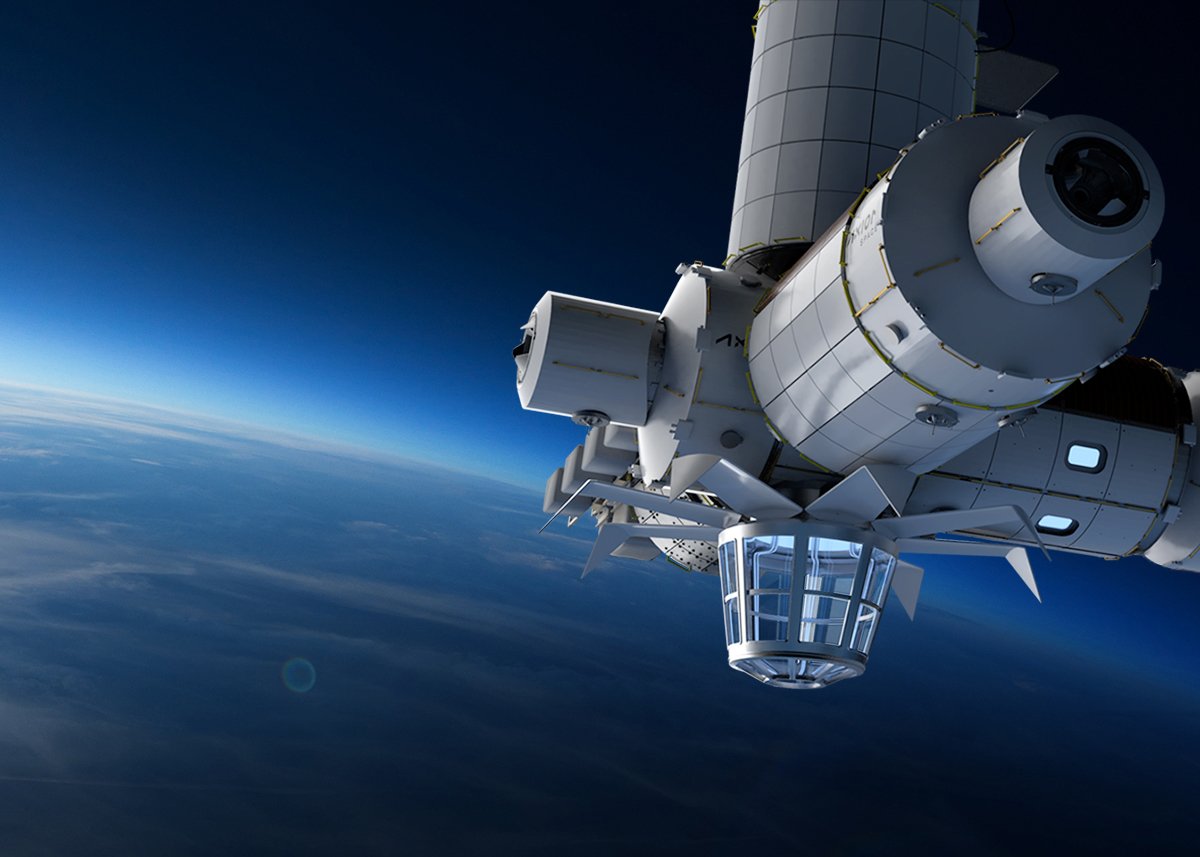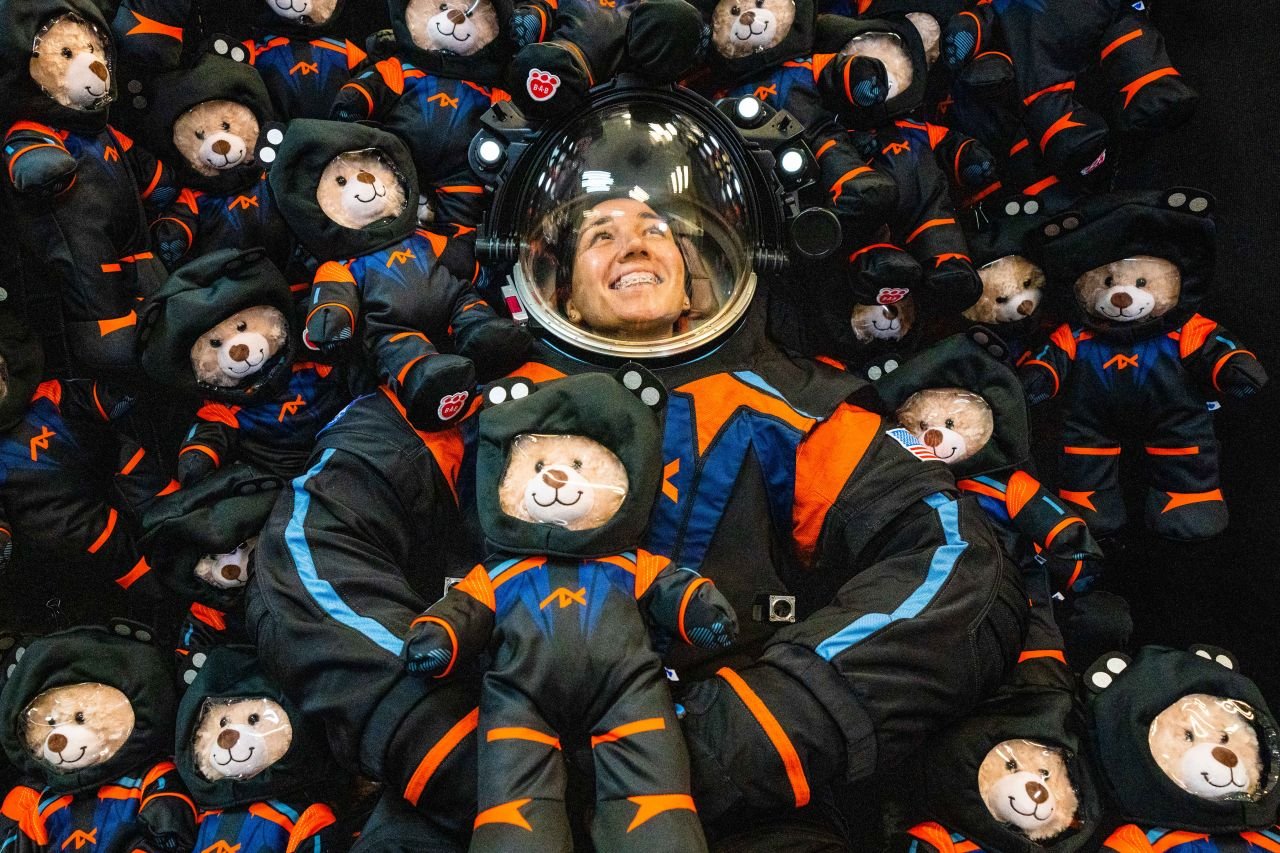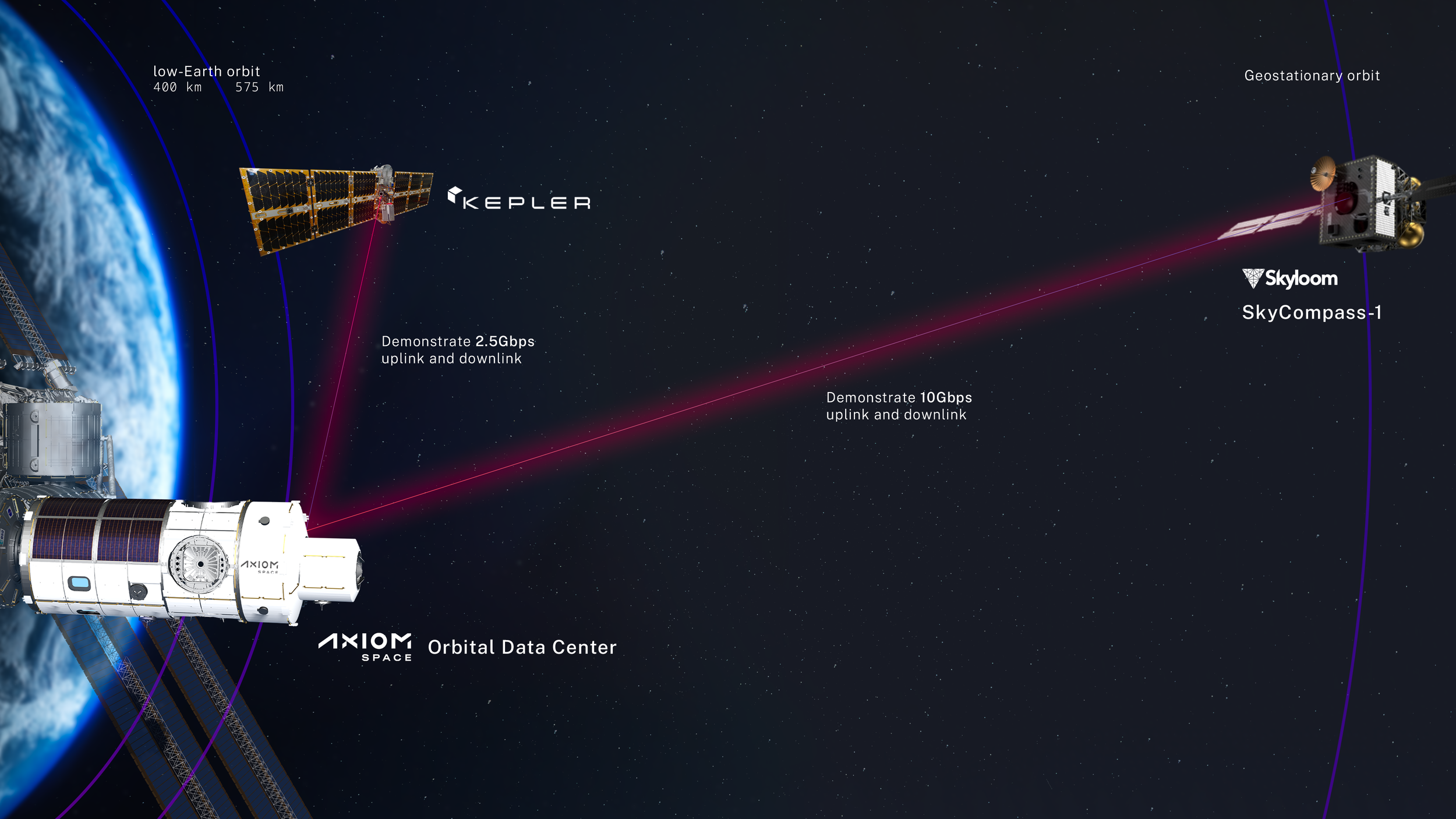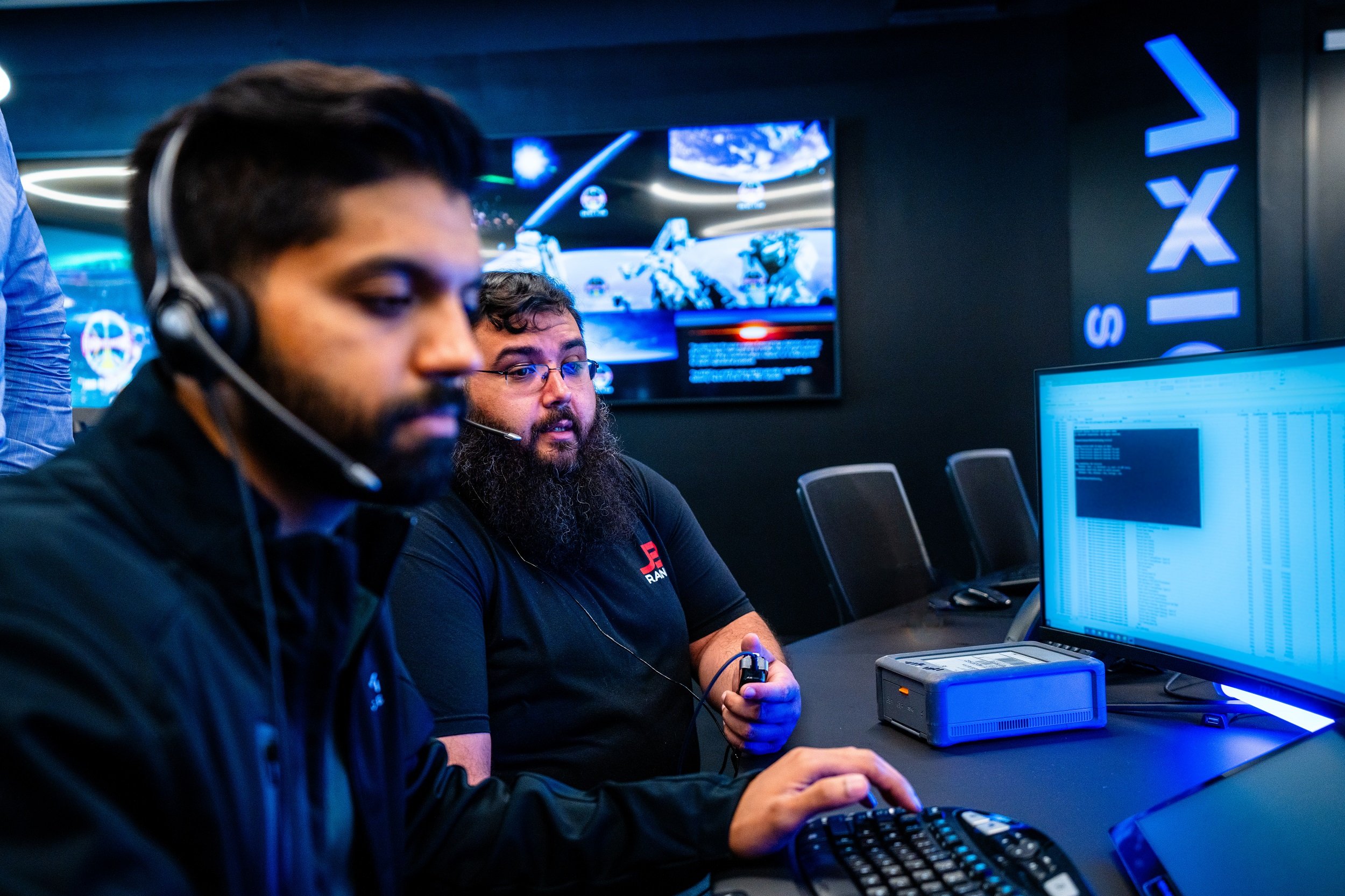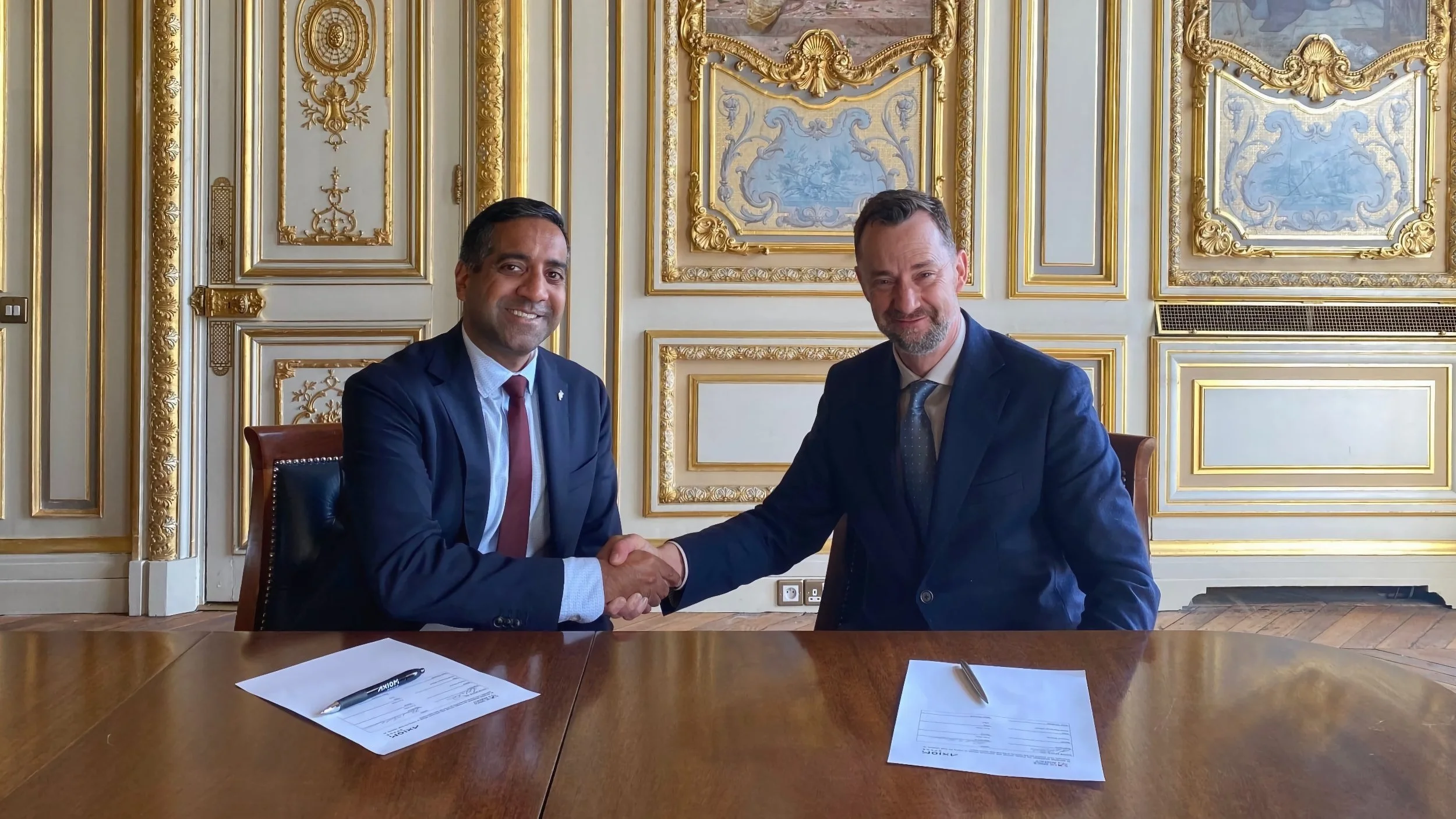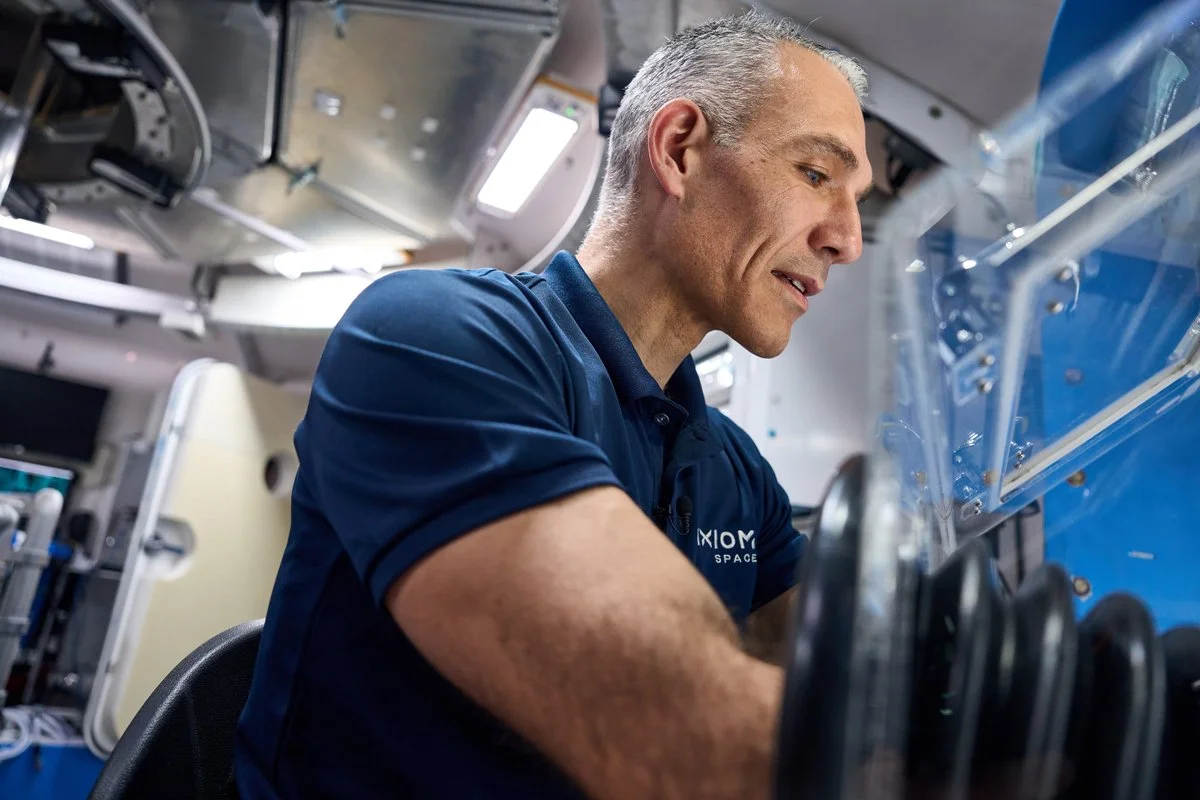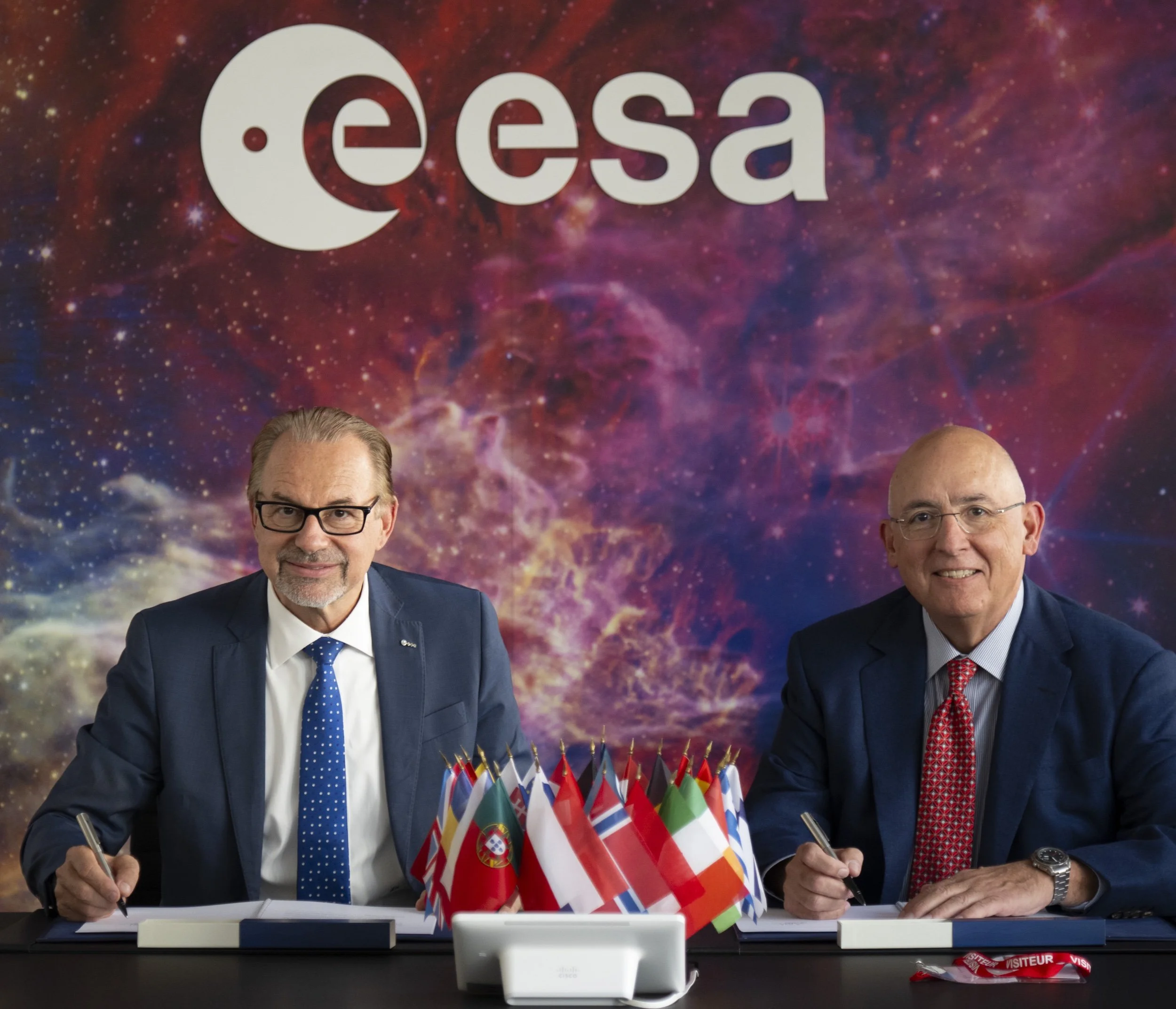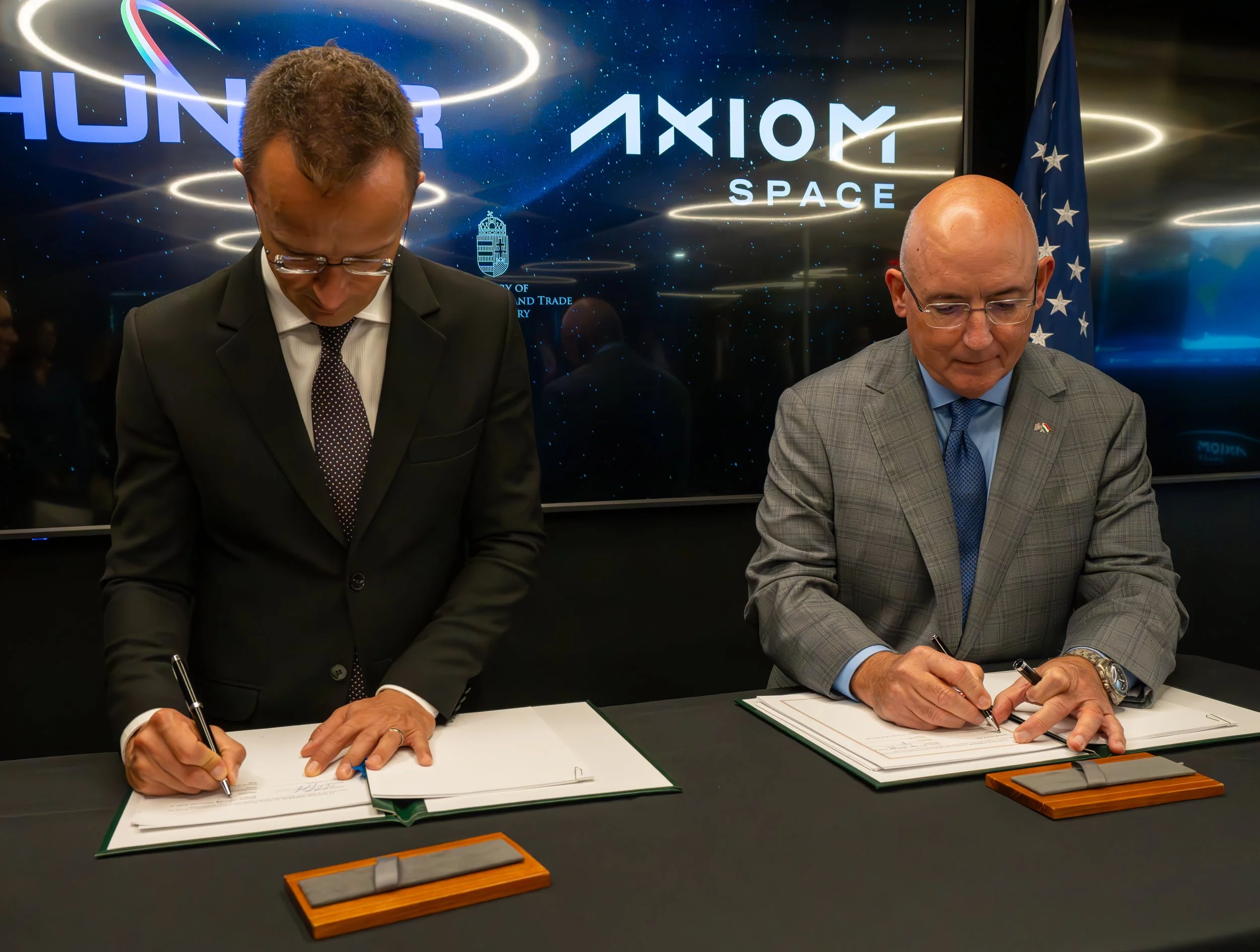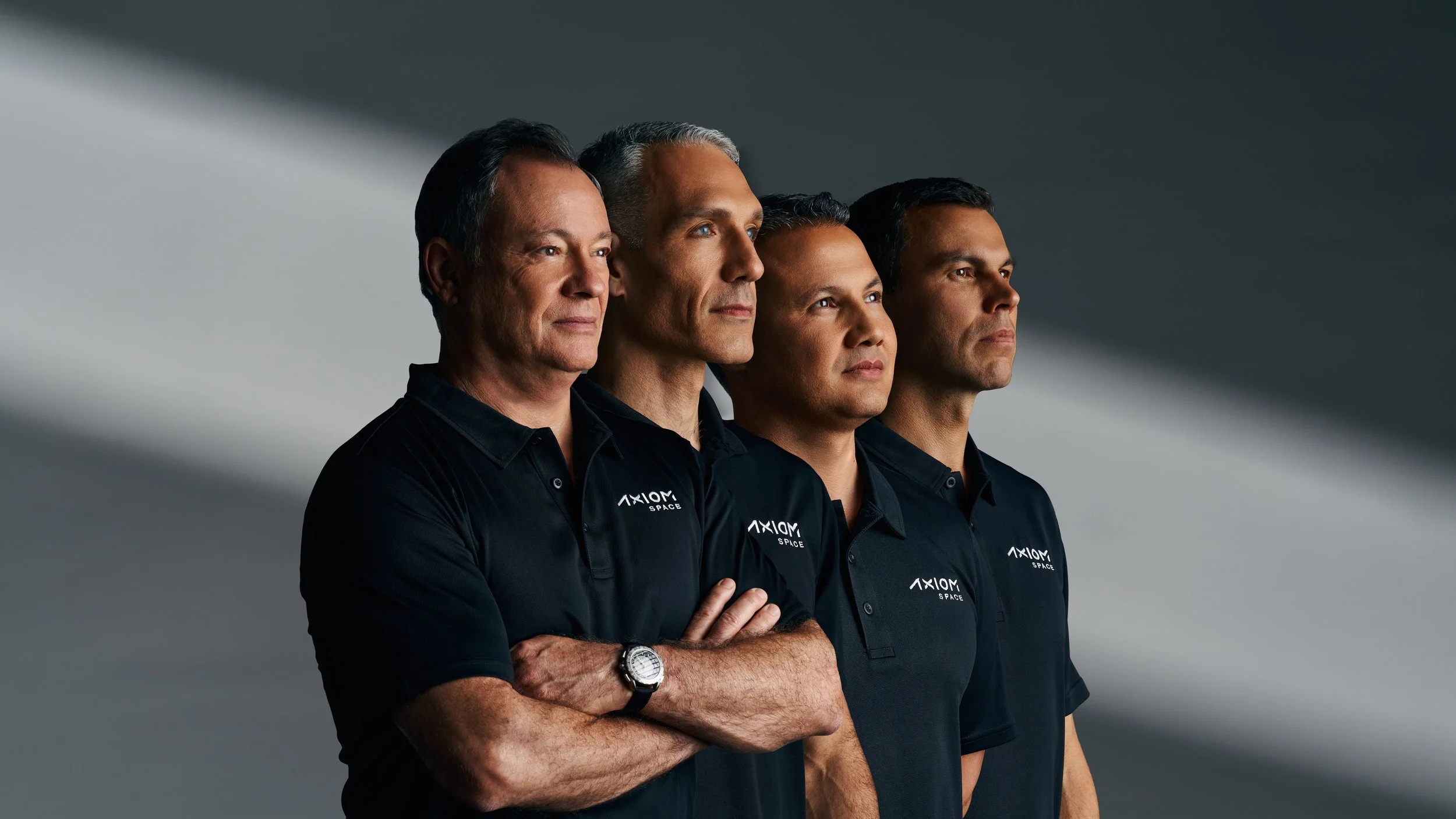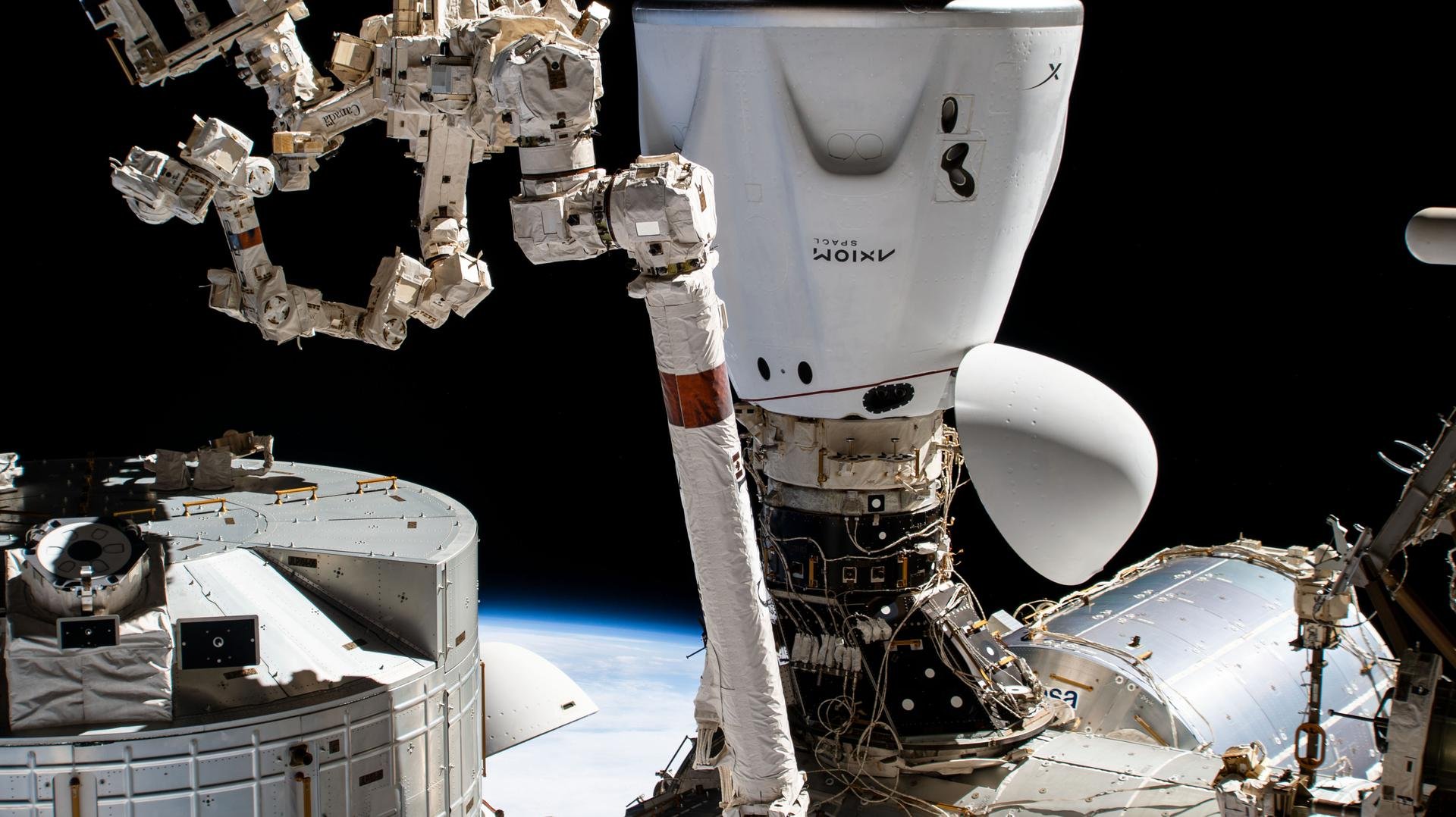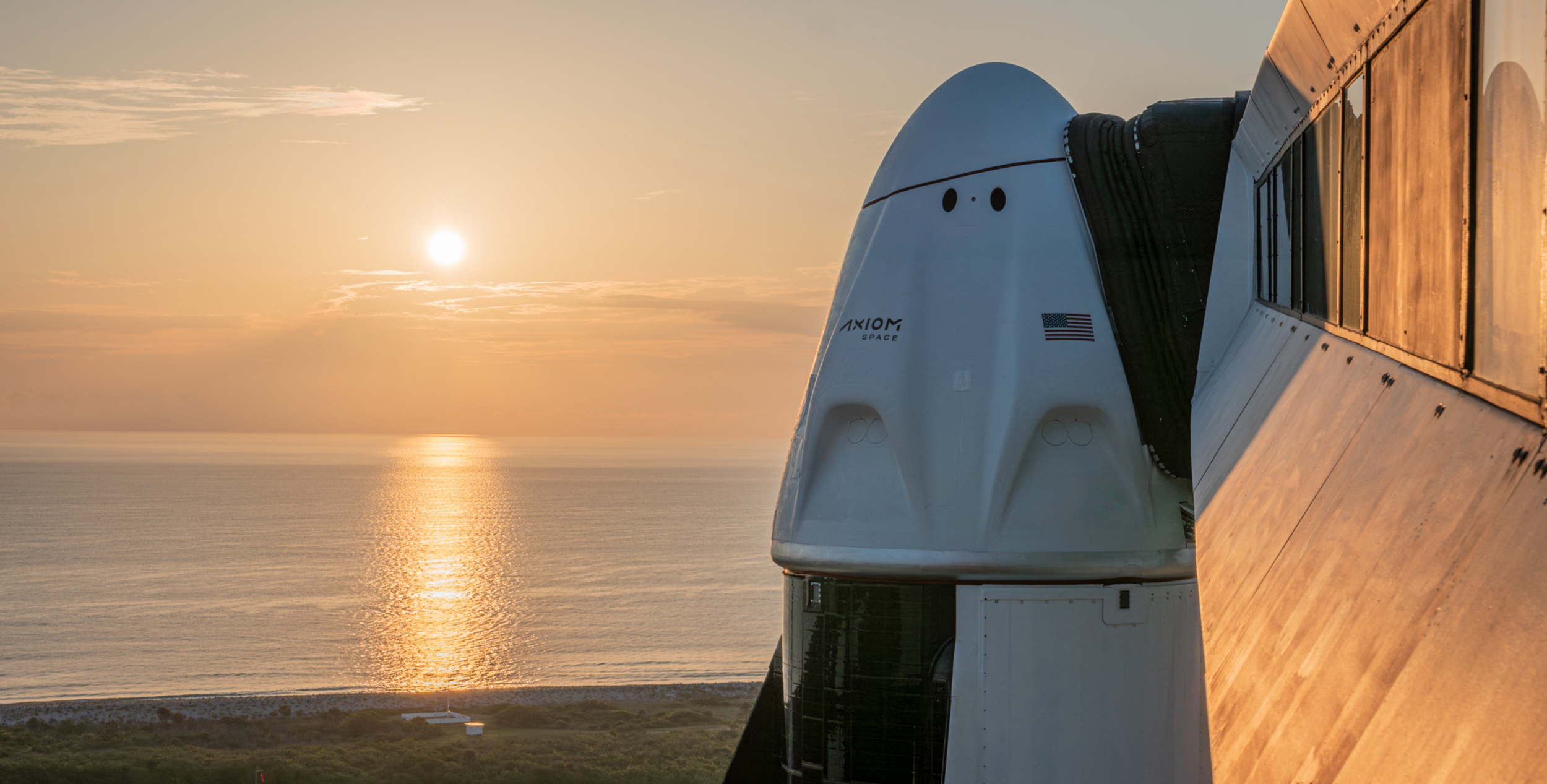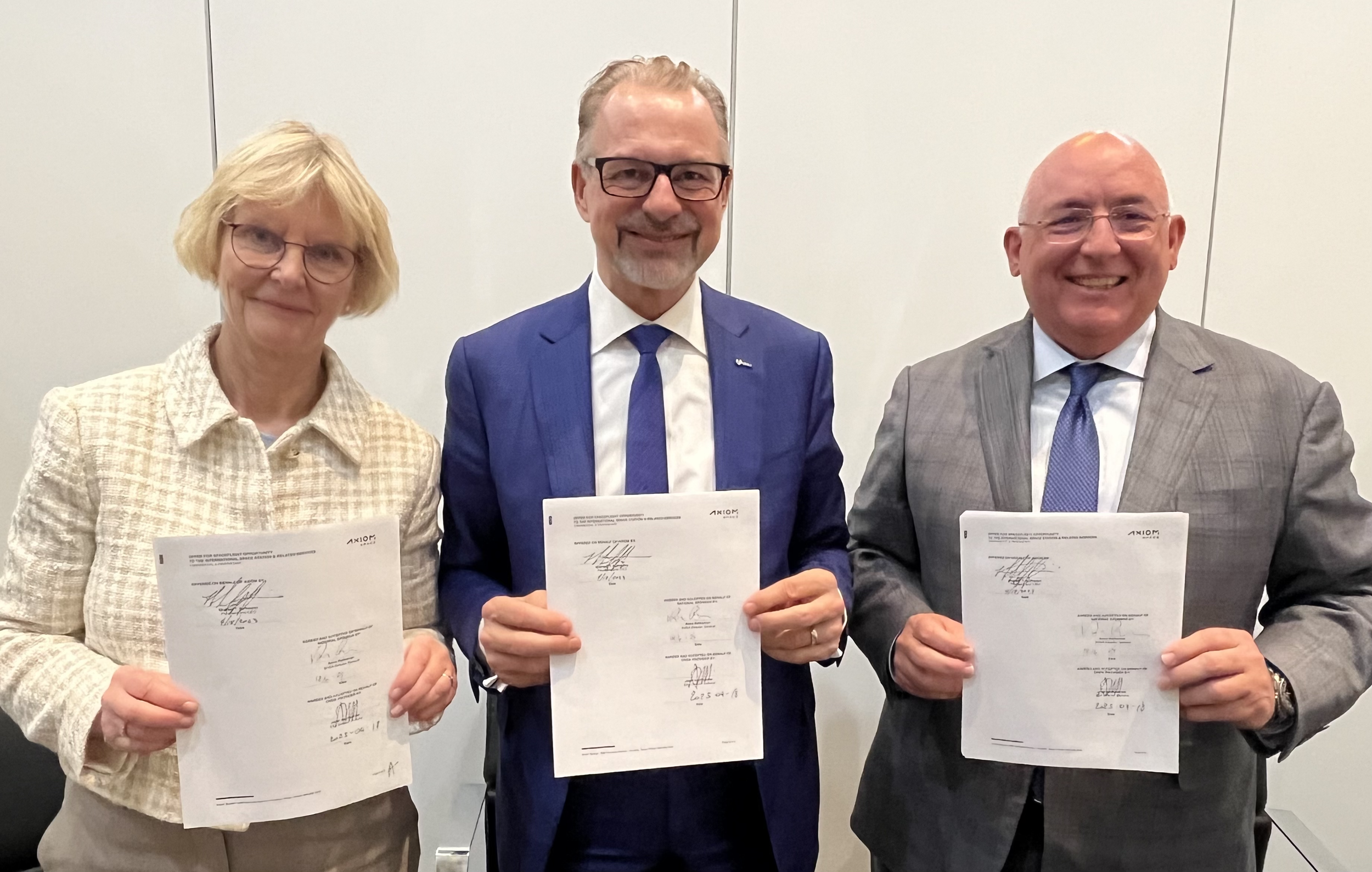Today, Dr. Mary Lynne Dittmar, Chief Government and External Relations Officer of Axiom Space, testified in a critical hearing in front of the House Science Space and Technology Committee – “ISS and Beyond: The Present and Future of American Low-Earth Orbit Activities” – to address the importance of the United States maintaining a continuous human presence in low-Earth orbit.
Axiom Space Announces Key Milestone with Artist, Photographer Satoshi Takamatsu
Axiom Space has taken a significant step forward in its collaboration with an artist and photographer Satoshi Takamatsu, representing art collective “WE,” signing an agreement to reserve him a seat on a future long-duration human spaceflight mission.
(Left to right) Tejpaul Bhatia, Axiom Space Chief Revenue Office and Satoshi Takamatsu, representing art collective “WE”. (Credit: Axiom Space)
The reservation came with a personal deposit and a commitment from Takamatsu to raise the additional funds needed to secure his seat with commercial support from key industry partners. As part of the agreement, Takamatsu plans to focus his contributions to the mission on the arts – photography to be exact.
"The progress made by photography, videography, and Virtual Reality (VR) technology makes it possible to replicate reality,” said Takamatsu. “It is now possible to shoot and reproduce imagery with standards that go beyond the limitations of the human eye. In this mission, I envision shooting the Earth in three different ways – 300 megapixels for still photography, 24K for videography, and 360 VR videography for HMD beyond 60PPD. In addition, these images could be upscaled to super-resolution using AI-based technology.
"Besides resolution,” he added, “we also need to look at dynamic range, frame rate, color range, and depth to recreate an amount of visual data that is as close to reality as possible."
Takamatsu’s reservation not only signifies a potential shift from STEM- to STEAM-focused on-orbit missions but also how private astronauts can shed new light on the world from space with a sharper focus and a different perspective.
"People's minds change when they look back at this planet from space,” explained Takamatsu. “They look beyond nationality, ethnicity, or religion. They intuit the importance of sustainability and hope for peace on Earth. This phenomenon is called the ‘Overview Effect.’ Out of the millions of photographs and videos taken of Earth from Space, none of them have truly been able to replicate this ‘Overview Effect,’ as there has never been a mission designed with that objective in mind. This is the gift I wish to give to humanity."
Tejpaul Bhatia, Axiom Space Chief Revenue Officer, offered that Axiom Space is looking forward to working with Satoshi on a future mission. He said, “With this agreement as the initial foundation, we will work together to build a comprehensive mission plan that supports an imagery-centered commercial astronaut effort on orbit for the benefit of all.”
About Axiom Space
Axiom Space is building for beyond, guided by the vision of a thriving home in space that benefits every human, everywhere. The leading provider of human spaceflight services and developer of human-rated space infrastructure, Axiom Space operates end-to-end missions to the International Space Station today while developing its successor, Axiom Station – the world’s first commercial space station in low-Earth orbit, which will sustain human growth off the planet and bring untold benefits back home. For more information about Axiom Space, visit www.axiomspace.com.
About Satoshi Takamatsu
Born in 1963, artist and photographer. After graduating from the School of Science and Engineering at the University of Tsukuba, Takamatsu joined Dentsu, the largest advertising agency in Japan. In 2005, he founded GROUD, a creative agency, and became CEO and Chief Creative Officer. Takamatsu has won many international advertising awards, including Gold Lions at the Cannes Advertising Festival. In 2002, he organized public viewings of the World Cup at the Tokyo National Stadium, the first of its kind to be officially endorsed by FIFA. He was also the first in the world to organize the filming of a TV commercial on the International Space Station for a Japanese beverage brand in 2001. Other commercials filmed in space include "No Borders," with an anti-war theme, and "Freedom," with themes of planetary sustainability and opposition to a future-controlled society, both for the Cup Noodles brand. Although they were product advertisements, these works conveyed strong social messages. Takamatsu announced his retirement from the advertising industry in 2015. He then spent eight months in Star City, Russia, undergoing cosmonaut training. He is currently a representative of Space Films and works as a photographer and artist. In 2014, Takamatsu presented his works at the exhibition "Mission [SPACE x ART] - Beyond Cosmologies" at the Museum of Contemporary Art Tokyo. In 2020, he organized his personal exhibition "Failure". In 2022, he founded an art collective WE for the space project. For more information, please contact WE PR team at: we-pr@vectorinc.co.jp
Ax-3 Astronauts Splashdown, Completing First All-European Commercial Astronaut Mission to ISS
A SpaceX Dragon spacecraft carrying the Ax-3 crew splashed down off the coast of Daytona, FL on Feb. 9.
After undocking from the International Space Station (ISS) on Wednesday, Feb. 7, the Axiom Mission 3 (Ax-3) crew safely splashed down off the coast of Florida aboard a SpaceX Dragon spacecraft at 8:30 a.m. ET on Feb. 9, 2024. The Ax-3 crew’s return officially concludes the first all-European commercial astronaut mission and Axiom Space’s third crewed mission to the ISS.
The Ax-3 crewmembers include Commander Michael López-Alegría of the U.S. and Spain, Pilot Walter Villadei of the Italian Air Force, and Mission Specialists Alper Gezeravcı of Türkiye and Marcus Wandt of Sweden and the European Space Agency (ESA).
“The successful return of our Ax-3 astronauts signifies more than just the completion of a human spaceflight mission; it marks a pivotal moment in commercial space exploration and significant milestone for Europe’s pursuits in low-Earth orbit,” said Axiom Space CEO Michael Suffredini. “Axiom Space’s first three commercial missions to the ISS are a testament to international advancement in space, with diverse crews representing eight nations, as well as — for the first time on Ax-3 — the European Space Agency. The success of these missions is an important step along our journey toward Axiom Station, underscoring our continuous efforts to expand access to low-Earth orbit.”
Ax-3 crewmembers Marcus Wandt (left), Walter Villadei, Micheal López Alegrīa, and Alper Gezeravcı (right) wave hello after the Dragon hatch opened on Recovery boat Shannon.
During their 18-day mission docked to the ISS, the Ax-3 crew lived and worked aboard the orbiting laboratory conducting more than 30 different experiments and more than 50 outreach engagements. Human research data collected on the ground before and after the mission, as well as in flight, will improve understanding of human physiology on Earth and in microgravity.
Ax-3 demonstrates that the European community of space-faring nations are pioneers in the burgeoning commercial space industry. The crew and the governments they represent are taking bold steps into a new era of leadership in low-Earth orbit.
Ax-3 celebrates many firsts: it was the first commercial spaceflight mission comprised of government and ESA-sponsored national astronauts; Mission Specialist Alper Gezeravcı became the first-ever Turkish astronaut; and Mission Specialist Marcus Wandt was the first ESA project astronaut to fly on a commercial space mission.
Ax-3 is the third in a series of proposed Axiom Space human spaceflight missions, marking a critical milestone toward the realization of Axiom Station — the world’s first commercial space station.
Axiom Space is playing an important role in offering human spaceflight opportunities to the larger international community. These missions are enabling governments, individuals, researchers, academic institutions, and organizations across the world to conduct comprehensive scientific research, technology demonstrations, and outreach engagements in the unique environment of microgravity.
Axiom Space’s first three missions to the ISS included crewmembers from the U.S., Spain, Israel, Canada, Saudi Arabia, Italy, Türkiye, and Sweden, with the support of ESA. In addition, last year, Axiom Space signed an MOU with ESA and the UK Space Agency to explore future human spaceflight opportunities.
Axiom Space plans to launch its fourth mission, Axiom Mission 4 (Ax-4), to the ISS no earlier than October 2024 from NASA’s Kennedy Space Center in Florida.
Boryung Corporation, Axiom Space Announce Joint Venture to Revolutionize Space Industry in Korea
Boryung Corporation, Axiom Space Announce Joint Venture to Revolutionize Space Industry in Korea
Boryung Corporation, a pioneer in innovative solutions based in South Korea, and Axiom Space, a leader in commercial human spaceflight and architect of the world’s first commercial space station, are proud to announce the formation of a joint venture aiming to leverage the unique strengths of both companies to advance the commercialization of low-Earth orbit (LEO) and push the boundaries of space exploration.
Through the JV, Boryung and Axiom Space will jointly explore business opportunities related to the future Axiom Station. The newly established JV will conduct all projects that Axiom Space will pursue in collaboration with South Korean companies and government and will have exclusive domestic rights for all operations utilizing Axiom Space’s technology and space station infrastructure in LEO.
The joint venture, named BRAX Space Corporation, will be headquartered in South Korea. The collaboration will focus on various businesses, including research and development, new initiatives in the space industry, and joint production efforts.
Jay Kim, Chairman & CEO of Boryung Corporation, expressed enthusiasm about the partnership, saying, "This joint venture with Axiom Space marks a significant milestone in our commitment to innovation and excellence. We are excited to combine our expertise with Axiom's to create unprecedented opportunities in the space industry throughout Korea."
Jack Lim, Head of New Portfolio Investments (NPI) Group in Boryung, has been appointed as the Chief Executive Officer (CEO) of BRAX. Lim has been overseeing Boryung's space business, including its investment in Axiom Space. In addition, Ryan Lee has been appointed as the Chief Financial Officer (CFO). Lee joined Boryung in 2023 and leads the Strategic Operations Group, which is responsible for investment review, finance, accounting, and legal affairs.
"The launch of BRAX is significant in that it opens the way for Korea to utilize the space station for space exploration, scientific research, and commercial purposes," said Lim. "As access to low-Earth orbit expands, the demand to utilize space platforms for research and experimentation will continue to grow."
BRAX Space Corporation will initiate its operations by focusing on several key areas, including research and experimentation platform services on Axiom Station, Korean human spaceflight projects, and joint development of space station modules.
"We have established a foothold to promote projects exclusively in South Korea with Axiom Space, which has the strongest competitiveness in the private sector in terms of LEO, the gateway to the Moon and Mars," Kim said. "Beyond our financial investment in Axiom Space, we will continue to develop our relationship as close strategic partners.”
Michael Suffredini, CEO of Axiom Space, added, “Boryung has become a vital partner over the years and is quickly asserting leadership within the space industry in Korea by promoting innovation, advancing research, and unlocking the potential for large-scale, on-orbit manufacturing. We are pleased to join Boryung in the venture to shape the future of LEO for their nation.”
About Boryung Corporation:
Boryung is a healthcare investment company founded in 1957 and headquartered in Seoul, South Korea. Following the company’s mission to become an indispensable contributor to human health, the company has expanded their business portfolio to the space healthcare industry. Recognizing space as a new realm for growth, Boryung acknowledges the increasing number of individuals anticipated to embark on prolonged space missions, highlighting the importance of ensuring human survival in the hostile space environment. Hence, the company believes there will be substantial opportunities to foster new technologies and meet the emerging needs in this field. For more information about Boryung, visit www.boryung.com.
About Axiom Space:
Axiom Space is building for beyond, guided by the vision of a thriving home in space that benefits every human, everywhere. The leading provider of human spaceflight services and developer of human-rated space infrastructure, Axiom Space operates end-to-end missions to the International Space Station today while developing its successor, Axiom Station – the world’s first commercial space station in low-Earth orbit, which will sustain human growth off the planet and bring untold benefits back home. For more information about Axiom Space, visit www.axiomspace.com.
Axiom Space, Build-A-Bear Continue Partnership Sending GiGi to Space on Another Mission to Inspire Youth through STEAM Education
Axiom Space and Build-A-Bear Workshop (NYSE: BBW) have continued their partnership and will send a furry fifth crew member to space, alongside the Axiom Mission 3 (Ax-3) astronauts in a launch planned no earlier than Jan. 17, from Florida. The teddy bear, named GiGi, will launch to space as the Ax-3 mission’s zero-gravity indicator wearing Axiom Space’s next-generation spacesuit. GiGi’s first mission was Axiom Mission 2 (Ax-2) in May, marking the first time Build-A-Bear sent a furry friend to space, and once again, both companies will engage youth through STEAM education and outreach.
Be part of this memorable moment with the unique replica of Axiom Space’s next generation spacesuit worn by the crew. Available now in select stores, online at Build-A-Bear and merch.axiomspace.com (Credit: Axiom Space)
GiGi’s return to space continues the tradition of having a zero-gravity indicator inside the spacecraft to provide a visual indicator when the spacecraft has reached the weightlessness of microgravity. As the fifth crew member of Ax-3, GiGi’s mission is to inspire children around the world to learn about space and consider careers in science, technology, engineering, the arts, and mathematics (STEAM).
“Our partnership with Build-A-Bear is key in helping to drive curiosity in young minds about space exploration,” said Sandra Nelson, Vice President of Marketing, Axiom Space. “We want our fifth crew member, GiGi, to inspire youth in space exploration and encourage them to grow their knowledge about STEAM. It’s imperative that we build a diverse workforce with a unique skillset ready to drive innovations and fuel new ideas to advance civilization.”
Julia Fitzgerald, Chief Marketing Officer at Build-A-Bear, shares her excitement on the continued partnership with Axiom Space. “We love to foster creativity and create special moments at Build-A-Bear, so we are pleased to continue our partnership with Axiom Space and see our beloved GiGi head back to orbit as part of the Ax-3 mission. Not only does this mark a special moment in history, but we also hope GiGi’s story inspires children to consider STEAM activities, hobbies and even careers. Our bears are always there for a hug and friendship, but we especially love when they can also provide the inspiration for pursuing a 'sky’s not the limit’ adventure.”
About The Ax-3 Mission
Ax-3 will be the first all-European commercial astronaut mission to launch to the space station – redefining the pathway to low-Earth orbit (LEO) and helping chart a course toward Axiom Station, the world’s first commercial space station.
The Ax-3 crewmembers are Commander Michael López-Alegría of the U.S. and Spain, Pilot Walter Villadei of the Italian Air Force, and Mission Specialists Alper Gezeravcı of Türkiye and Marcus Wandt of Sweden and ESA. To learn more about the Ax-3 mission, visit www.axiomspace.com/ax3 .
GiGi’s Story
GiGi was the first Build-A-Bear to make bear history this past spring as the fifth crew member and zero-gravity indicator aboard the historic Ax-2 mission. GiGi, yet again, will have the special opportunity to serve as the zero-g indicator to return to space aboard the upcoming Ax-3 mission. GiGi shares these inspiring words:
“My first space mission was the culmination of a lifelong dream. Now, I am a full-time astronaut and aspiring pilot, and this next space adventure will give me the opportunity to learn even more and complete my pilot training. With a little heart and a lot of hard work and dedication, I want all children to know that dreams are always within reach.”
To read GiGi’s full story and follow her space adventures please visit her blog at www.axiomspace.com/news/meet-gigi. Fans can also follow GiGi’s exciting adventures on all @buildabear social channels.
Celebrate GiGi’s Second Mission
Be part of this memorable moment and join Build-A-Bear for an out-of-this-world party with fun events at participating Build-A-Bear Workshops. Visit select stores on Saturday, January 13 and Saturday, January 20 from 11 a.m. to 2 p.m. for fun sticker giveaways, an appearance from our mascot Bearemy, and the opportunity to make a furry friend and outfit them in the Axiom Space next-generation spacesuit. This unique replica of the spacesuit worn by the crew is available in select stores and online at Build-A-Bear and merch.axiomspace.com.
###
ABOUT AXIOM SPACE
Axiom Space is building for beyond, guided by the vision of a thriving home in space that benefits every human, everywhere. The leading provider of human spaceflight services and developer of human-rated space infrastructure, Axiom Space operates end-to-end missions to the International Space Station today while developing its successor, Axiom Station – the world’s first commercial space station in low-Earth orbit, which will sustain human growth off the planet and bring untold benefits back home. For more information about Axiom Space, visit www.axiomspace.com.
ABOUT BUILD-A-BEAR®
Build-A-Bear is a multi-generational global brand focused on its mission to "add a little more heart to life" appealing to a wide array of consumer groups who enjoy the personal expression in making their own "furry friends" to celebrate and commemorate life moments. Nearly 500 interactive brick-and-mortar experience locations operated through a variety of formats provide guests of all ages a hands-on entertaining experience, which often fosters a lasting and emotional brand connection. The company also offers engaging e-commerce/digital purchasing experiences on buildabear.com and its age-gated, adult-focused "Bear Cave". In addition, extending its brand power beyond retail, Build-A-Bear Entertainment, a subsidiary of Build-A-Bear Workshop, Inc., is dedicated to creating engaging content for kids and adults that fulfills the company's mission.
Axiom Space Partners with Kepler Space and Skyloom to Operationalize the World’s 1st Orbital Data Center
The Houston-based company Axiom Space has entered agreements with Kepler Communications US Inc. and Skyloom Global Corp. to integrate and demonstrate high data rate Optical Intersatellite Links (OISLs) on the first module of Axiom Space’s commercial space station – Axiom Station. In parallel, the Axiom Space team is building the world’s first scalable, cloud technology-enabled, commercial orbital data center to be hosted on Axiom Station.
(Credit: Axiom Space)
The development of this first tranche of orbital data center capability (ODC T1) will support the transformation of low-Earth orbit (LEO) into a global space marketplace by maturing the necessary technologies and infrastructure for large-scale and secure space-based data processing. One of the key features of the orbital data center is “Earth independence” – the ability to provide in-space cloud services without the need to connect back to terrestrial cloud infrastructure. ODC T1 will help operationalize data processing and management applications for Axiom Space’s customers, while setting the stage for lunar and Mars use cases where on-premises data processing will be required to support exploration and economic development beyond Earth’s orbit.
The effort with Kepler and Skyloom will enable demonstration of OISLs to allow for data to be transmitted to and from the orbital data center via the Kepler and Skyloom relay constellations. The OISLs will allow for up to 10 gigabits-per-second data throughput and meet Space Development Agency (SDA) interoperability standards.
“This is a pivotal moment for in-space data processing infrastructure and capabilities,” said Jason Aspiotis, Axiom Space’s Director of In-Space Infrastructure & Logistics. “For the past two years, our team has been demonstrating proof of concepts and developing use cases for in-space data processing infrastructure. The ODC T1 effort and collaboration with Kepler and Skyloom will help us realize our vision of building and operationalizing the world’s first orbital data center. The data center will provide unprecedented data storage and processing capacity in a commercial, scalable, and economical way to aid microgravity researchers, Axiom Station users, and satellites in LEO, medium-Earth orbit (MEO) and Geosynchronous Equatorial Orbit (GEO) through optical communications relays and via the extended mesh network.”
In preparation for the ODC T1 deployment, Axiom Space plans to install a smaller data processing prototype aboard the International Space Station to conduct testing and demonstrate initial capabilities. The prototype is planned for launch in 2024 and will test applications in artificial intelligence and machine learning, data fusion, and space cybersecurity.
“We will work to validate use cases at a sub scale and, at the same time, obtain flight heritage on the underlying data center hardware,” said Aspiotis. “Having a prototype on the ISS will serve as a building block toward the roughly half-cubic-meter sized data server rack we plan to launch by 2027.”
Axiom Space is also actively conducting demonstrations on the AWS Snowcone currently aboard the space station, proving the basic utility of a data center in space and implementing processes and procedures for future orbital data center operations.
“Kepler’s SDA-compatible space relay network leverages the latest technological advances in optical communications,” said Steve Bennett, Chief Operating Officer for Kepler. “We are pleased to partner with Axiom Space to provide 24-7 on-orbit capabilities to demonstrate the benefits our low latency, high-throughput data relay network can provide Axiom Space’s orbital data center. With the proliferation of spacecraft in LEO, the demand for continuous, high-capacity connectivity on orbit continues to grow. The Kepler Network is designed to help close the business case for commercial space stations, Earth observation companies, and other space operators requiring low latency and high bandwidth connectivity.”
“Skyloom is excited to partner with Axiom Space,” said Eric Moltzau, Skyloom’s Chief Commercial Officer. “This demonstration will prove the competitive advantages of our SkyCompass-1 optical communications network, which we are jointly developing and deploying with Space Compass and which will offer services beginning in 2025. This project with Axiom Space will illustrate SkyCompass-1's low latency, high bandwidth network capabilities.
“Skyloom is a network service provider and space-based telecom equipment manufacturer,” Moltzau added. “We build all the infrastructure to support network services and we see the partnership with Axiom Space as a tremendous opportunity to grow together to provide these services for all kinds of commercial and government users. This demonstration is the start of laying the initial infrastructure for a Commercial Space Internet to flourish in near earth orbit and on a planetary scale.”
Once Axiom Station Hab One (AxH1) is connected to the ISS, the data center hardware and optical communications terminals will be flown to AxH1 for module integration in preparation for initial testing. ODC T1 is planned to launch by 2027. The testing expects to prove out an array of capabilities, including 24/7 and high-bandwidth data connectivity between Axiom Station via a LEO and GEO relay network back to Earth; real-time voice and video capabilities for Axiom Station and its crew; high-speed data transport from experiments and payloads; connectivity and interoperability between LEO and GEO satellites with AxH1 as a network translation node; and orbital data center use cases in Earth-independent data storage and fusion, artificial intelligence and machine learning, and in-space cybersecurity. Once testing and evaluation are complete, the ODC T1 will be ready for real-time operations on orbit in support of Axiom Station customers and the mesh network.
The commercialization of LEO promises to stimulate new markets, drive innovations and fuel new ideas to advance civilization. The development of space-based data centers, equipped with cloud technology and advanced cyber security, is an integral part of creating a sustainable communications ecosystem capable of supporting human spaceflight, exploration, and commerce in space to generate economic and social value for the world.
About Kepler
Kepler Communications US Inc. is a satellite telecommunications provider on a mission to build the Internet for space. Incorporated in 2015, Kepler provides real-time, continuous connectivity for space communications, abolishing barriers to make space-generated data universally available. The Kepler Network will initially service low earth orbit (LEO) and plans to provide connectivity services to space missions in LEO, MEO, GEO, and beyond. Kepler is building a global company to enable communications for the future space economy. To learn more about Kepler Communications US Inc., visit www.kepler.space.
About Skyloom
Skyloom is a Broomfield, CO-based telecommunications innovator founded with the mission to develop, deploy, and operate one of the fundamental pieces of tomorrow's space-based telecommunication infrastructure for the provision of data transport services on a planetary scale. They leverage deep heritage in space optical communications to enable real time data transfer so that customers and decision makers can leverage perishable information. www.skyloom.co
About Axiom Space
Axiom Space is building for beyond, guided by the vision of a thriving home in space that benefits every human, everywhere. The leading provider of human spaceflight services and developer of human-rated space infrastructure, Axiom Space operates end-to-end missions to the International Space Station today while developing its successor, Axiom Station – the world’s first commercial space station in low-Earth orbit, which will sustain human growth off the planet and bring untold benefits back home. For more information about Axiom Space, visit www.axiomspace.com.
Axiom Space Goes All-In on AWS for Its Enterprise Cloud Services Needs on Earth
Houston-based company Axiom Space to rely on AWS terrestrial services (cloud, database, security, high-performance compute) to support its operations, business, and engineering teams
Axiom Space, a leader in commercial human spaceflight and architect of the world’s first commercial space station, today announced that it is going all-in on Amazon Web Services (AWS) in support of its terrestrial information technology (IT) infrastructure. By migrating its enterprise IT to AWS, Axiom Space looks to provide its engineers, ground operations, and business development teams the terrestrial cloud infrastructure necessary to enable development of its next-generation commercial space station, Axiom Station.
Credit: Axiom Space
In parallel to going all-in on AWS for enterprise IT needs, Axiom Space and AWS will continue to collaborate on validating cloud-based hardware and software capable of supporting in-space workloads. These include cutting-edge scientific research and discovery that Axiom Space supports on-orbit to benefit new pharmaceuticals development, stem cell research, regenerative medicine, and other areas of study in the microgravity environment. Axiom Space and AWS are also collaborating on the development and demonstration of in-space cybersecurity solutions that set the foundation for operating a cybersecure Axiom Station.
Christian Maender, EVP of Space Commercialization for Axiom Space said, “We are very excited to expand our collaboration with AWS. Going all-in on enterprise IT needs provides us the necessary cloud services foundation on Earth to support our engineering, operations, and business teams as they build Axiom Station and the markets it will serve. We remain excited to collaborate with AWS on advancing the state of the art of cloud infrastructure on-orbit as we build a multi-cloud and multi-user environment for our future space station customers.”
In order to support a thriving global space economy in low-Earth orbit, Axiom Station will require cloud-based technology to quickly and reliably analyze data on orbit, closer to where the data is collected, even when operating with limited bandwidth and connectivity. As a first step on this path, Axiom Space and AWS worked together to integrate and operate an AWS Snowcone device on the International Space Station as part of the Axiom Mission 1 (Ax-1) in April 2022. Together, the teams used the device’s powerful edge processing capability to apply a sophisticated machine learning (ML)-based object recognition model and quickly analyze images of various scientific experiments on orbit. Today the AWS Snowcone – a small, rugged, and secure device offering edge computing, data storage, and data transfer on-the-go, in austere environment with little or no connectivity – remains on orbit and Axiom Space continues to demonstrate unique use cases in edge processing, artificial intelligence (AI), ML, and in-space cybersecurity with its partners (Axiom Space Collaborates to Advance In-Space Data Processing and Cybersecurity Solutions — Axiom Space).
“Axiom Space is using AWS’s global infrastructure and a broad and deep portfolio of cloud services to deliver revolutionary solutions to the space industry,” said Dave Levy, AWS vice president, worldwide public sector. “We are proud to support Axiom Space’s vision to incorporate advanced cloud-based technology into future missions supporting on-orbit research, scientific discovery, and space exploration.”
Beyond going all-in on AWS for its enterprise IT needs, and demonstrating edge compute capabilities via the AWS Snowcone on the ISS, Axiom Space and AWS intend to continue exploring:
Using AWS for modeling and simulation in support of Axiom Station development
Equipping Axiom Space’s mission control center (MCC-A) with cloud capabilities
The development and use of digital engineering capabilities
Applying AI/ML for autonomy specific use cases around Axiom Station safety, monitoring, and mission operations
Working together with other industry teams (e.g., Energy, Health, Telecommunications, Advanced Manufacturing) to help build and mature the in-space economy
Deploying and operationalizing AWS cloud capabilities as part of Axiom Space’s multi-cloud and multi-user Orbital Data Center
ABOUT AXIOM SPACE
Axiom Space is building for beyond, guided by the vision of a thriving home in space that benefits every human, everywhere. The leading provider of human spaceflight services and developer of human-rated space infrastructure, Axiom Space operates end-to-end missions to the International Space Station today while developing its successor, Axiom Station – the world’s first commercial space station in low-Earth orbit, which will sustain human growth off the planet and bring untold benefits back home. For more information about Axiom Space, visit www.axiomspace.com.
Axiom Space Welcomes New Chief Financial Officer
UK Space Agency and Axiom Space Sign Agreement on Plans for Historic Human Spaceflight Mission
Tejpaul Bhatia, Chief Revenue Officer at Axiom Space (left) and Dr Paul Bate, Chief Executive Officer at the UK Space Agency (Credit: UK Space Agency)
Astronauts from the United Kingdom could fly to space on a future Axiom Space mission, thanks to a new agreement signed between the UK Space Agency and the Houston-based space company.
The agreement between the UK Space Agency and Axiom Space sets out plans for the two organizations to work together to pursue a commercially sponsored, UK astronaut mission. The announcement comes as Science Minister George Freeman is due to open the London Stock Exchange today, where he will speak about opportunities to bring further investment into the UK space sector.
On this future flight, the UK astronauts would launch to space, spending up to two weeks on orbit to carry out scientific research, demonstrate new technologies, and participate in education and outreach activities.
The mission would build on the UK government’s National Space Strategy and the UK Science and Technology Framework, which highlights the important contribution of international relationships to the UK’s capabilities and identifies five critical technologies: Artificial Intelligence, engineering biology, future telecommunications, semiconductors, and quantum technologies.
George Freeman MP, Minister of State at the Department for Science, Innovation and Technology, said:
“The prospect of a historic UK mission with Axiom Space has the potential to inspire a whole new generation to reach for the stars, while supporting our efforts to build one of the most innovative and attractive space economies in the world, so I look forward to seeing the next stage of this exploratory work develop.
“We want to put the UK at the forefront of the global race for commercial space investment, continue to support scientists and engineers to test new technologies and carry out important research and, ultimately, bring the benefits back to people and businesses across the country.”
Michael Suffredini, Axiom Space CEO, added:
“Axiom Space is looking forward to working with the UK Space Agency on a future human spaceflight mission. With this agreement as the initial foundation, we will build a comprehensive mission plan in support of the UK’s national and agency objectives to advance its capabilities in space exploration and discovery. Together, we will look to harness the benefits of microgravity and help push the boundaries of innovation to advance our civilization.”
The UK Space Agency is calling on UK universities, research institutions and industry to share their ideas for experiments and technology demonstrators which could be conducted by the crew on orbit over a two-week period.
The UK Space Agency is also interested in ideas from UK organizations for a national space education and public engagement program alongside the mission to highlight the diverse range of rewarding careers available in the space sector, promote STEM uptake, and highlight the powerful role of space in the lives of UK citizens.
Dr. Paul Bate, Chief Executive of the UK Space Agency, said:
“This agreement paves the way for UK astronauts to conduct scientific research in orbit, and to inspire millions of us here on Earth. It takes thousands of people to complete a crewed space mission and return the astronauts safely home, highlighting the huge variety of careers available in the UK space sector right now. There is much to do, and this agreement is the springboard for the UK Space Agency, Axiom Space and the mission sponsors to assess how we best push forward the frontiers of knowledge and innovation and showcase the power of space to improve lives on Earth.”
The UK Space Agency is working with Axiom Space on plans for a commercial mission with the full support of the European Space Agency.
Daniel Neuenschwander, Director of Human and Robotic Exploration at ESA, said:
“ESA is working on Europe’s preparation of the post-ISS era and the development of a sustainable commercial space economy in Low Earth Orbit. This unique flight will allow ESA to enhance its actions with new partnership schemes and implement together with the United Kingdom a series of research experiments, which will further deepen the knowledge on exploration in and for Europe.”
UK Space President, Dr. Alice Bunn, said:
“Since the first astronauts landed on the Moon over 50 years ago, human spaceflight has captured the imagination of billions of people. But space is no longer for the privileged few; we have witnessed incredible growth in the application of space technology and data to everyday lives, and we recognize the immense and specific value of humans being able to push the boundaries of science and technology operating within the unique conditions of space.
“For this reason, the agreement between the UK Space Agency and Axiom Space is an incredibly exciting one, providing the potential to extend the already significant innovation that our UK space sector is spearheading.”
Axiom Space is the commercial space industry’s only full-service orbital mission provider, conducting end-to-end crewed missions to the International Space Station. The expert team at Axiom Space is helping nations and organizations build human spaceflight programs, develop astronaut selection processes, and provide the expertise needed to expand the international community of space explorers to a larger and more diverse representation of humanity.
Ax-3 Mission to Expand Government-Sponsored Research in Low-Earth Orbit
Ax-3 Pilot Walter Villadei practicing research operations in the HERA glovebox.
Axiom Space announced today further details on the groundbreaking science research and technology demonstrations planned for the upcoming Axiom Mission 3 (Ax-3) to the International Space Station (ISS). The Ax-3 crewmembers will represent their nations and perform scientific experiments and demonstrations in low-Earth orbit (LEO) that are of high national importance.
Axiom Space is also partnering with many scientific organizations to continue understanding the effects of spaceflight on the human body as well as explore opportunities of applied research in space to benefit health and medical treatments on Earth.
The Ax-3 astronauts will conduct more than 30 different experiments during their mission. Human research data collected on the ground before and after the mission as well as in flight will improve understanding of human physiology on Earth and in microgravity. Furthermore, this mission will harness opportunities for industrial advancements and develop technologies for humanity’s progress.
Unique to this mission, there is a strong focus on scientific portfolios led by European countries represented on the Ax-3 mission, to include Italy, Türkiye, and Sweden in partnership with the European Space Agency (ESA). Commercial and academic partnership activities also remain a strong focus for the Ax-3 mission, as Axiom Space leads in building a global research community and robust and sustainable economic ecosystem in LEO.
The Ax-3 crewmembers are Commander Michael López-Alegría of the US/Spain, Pilot Walter Villadei of the Italian Air Force, and Mission Specialists Alper Gezeravcı of Türkiye and Marcus Wandt of Sweden/ESA.
A SpaceX Falcon 9 rocket will launch the Ax-3 crew aboard a Dragon spacecraft to the ISS no earlier than January 2024 from NASA’s Kennedy Space Center in Florida.
SELECT AX-3 MISSION INVESTIGATIONS
Italy
The Italian portfolio consists of experiments led by the Italian Air Force (ItAF) and the Italian Space Agency (ASI), involving Italian universities, research centers, and companies wishing to leverage microgravity for biological and technological testing and development.
Evaluation of Endothelial Function in Personnel Exposed to Microgravity During Orbital Flight Activity
As human research led by ItAF, the endothelial function experiment will use a technique to assess the vascular health and reactivity of astronauts before, during, and after spaceflight. The results will be compared to measurements from non-orbital flight personnel. The goal of this project is to better understand how vascular health changes during space missions to enhance knowledge related to future long-duration human spaceflight missions.
Amyloid Aggregation Upgrade
Led by ASI, this project builds on previous work in microgravity to investigate the aggregation of amyloid beta (Aβ) proteins, which are implicated in neurodegenerative diseases such as Alzheimer’s. Microgravity can disrupt the normal folding and unfolding of proteins, leading to the formation of misfolded proteins that are more likely to aggregate. Analyzing these proteins in microgravity provides an opportunity to better understand the mechanism of their aggregation and the formation of amyloid plaques, which can ultimately help develop new treatments. The research could also help identify potential risks for neurodegeneration for long-duration human spaceflight missions.
Italian Space Operations Centre (ISOC) services for ISS
The ISOC services for ISS experiment aims to improve real-time space awareness with decentralized capabilities, providing an up-to-date space object catalogue and state-of-the-art algorithms to manage space safety. Using the systems onboard the ISS, ISOC will test the remote collection and process data needed to avoid collisions with resident space objects and to protect instrumentation from severe solar events.
Türkiye
Led by the Scientific and Technical Research Council of Türkiye (TUBITAK) and Turkish Space Agency (TUA), the Turkish portfolio has a strong focus on advanced technological development of novel hardware and capabilities to further advance Türkiye’s goals as a space-faring nation and build on its successes in satellite development.
Clustered Regularly Interspaced Short Palindromic Repeats (CRISPR-Gem)
CRISPR is a groundbreaking genetic editing scientific technique that can be used to increase, decrease, insert, or remove genes from organisms. This work builds on previous microgravity research showing how microgravity affects the growth, movement, and genetics of plants, and could provide valuable insights into plant adaptation to extreme environments and help develop more resilient crops for agriculture.
Vokalkord
The Vokalkord experiment will focus on developing an artificial intelligence system to detect over 70 types of disease by analyzing audio data on respiratory, speaking, and cough sounds. This project further develops their software for use on Earth as a tool to identify and diagnose lung cancers, voice and vocal cord diseases, infectious diseases, and even cardiovascular and eye disease. This project also aims for the further development of a telemedicine application that can be used in space missions and space tourism.
Innovative Research on Novel Space Alloys (UYNA)
The UYNA experiment will investigate novel medium entropy and high entropy alloys (MEAs and HEAs respectively). These types of metal alloys are characterized by their high strength, toughness, and resistance to corrosion, and are of interest for potential applications in many industries, including space, aviation, automotive, energy, and medicine. The data from this experiment will help to improve our understanding of the formation and properties of MEA/HEA alloys, which could lead to the development of new and improved materials for a variety of applications.
ESA/Sweden
With a well-established and strong history in spaceflight, the ESA portfolio consists of projects and experiments that will continue to build on ESA’s mission to shape the development of Europe’s space capabilities and bring value to the citizens of Europe and the world.
The Analyzing Interferometer for Ambient Air-2 (ANITA-2)
The ANITA-2 project will sample air from the atmosphere on the ISS and automatically analyze trace contaminants. The system can recognize and quantify 33 trace gases via infrared light and identify unknown substances for additional analysis on the ground. This ongoing ESA project is part of ESA's technology development efforts for safe spaceflight in LEO and beyond.
Multi-Avatar and Robots Collaborating with Intuitive Interface (Surface Avatar)
The ESA-led Surface Avatar project is focused on developing robotic assets for space exploration, building infrastructure on planets and asteroids, and optimizing processes for data connections and communications relays. The applications of this project are also useful in scenarios such as arctic exploration, search and rescue in disaster zones, and under-sea maintenance.
Orbital Architecture
Architecture has been known to play a crucial role in shaping the physical and social environments, and it directly impacts human physical and psychological well-being. This study aims to investigate the effects of architectural settings, and their properties on astronaut’s cognitive performance, stress levels, and stress recovery rate. More specifically this activity looks to study if effects between the above-mentioned factors, observed in isolated and confined environments on Earth, and especially in space analog missions, are similarly observed in the environment of a space station.
Partnerships
As for previous missions, Axiom Space has partnered with many scientific organizations to continue to monitor the effects of spaceflight on the human body as well as explore opportunities of applied research in space to benefit health and medical treatments on Earth. Biological investigations into the development and treatment of certain cancers and neurological disorders are a strong focus for Ax-3.
National Stem Cell Foundation
Brain organoids are small 3D aggregates of neural cells that can be used to explore how the human nervous system develops or starts to degenerate. The Cosmic Brain Organoids project will use brain organoids derived from the stem cells of patients with the neurodegenerative diseases Parkinson's Disease and primary progressive Multiple Sclerosis to assess how microgravity affects the cells and uncover cellular pathways that could suggest novel therapeutic interventions for neurodegenerative diseases on Earth.
Sanford Stem Cell Institute
The Cancer in LEO project from the Sanford Stem Cell Institute (SSCI), in partnership with Axiom Space, is studying tumor organoids in microgravity with the aim of identifying the early warning signs of cancer for prediction and prevention of the disease. This project is part of the expanded Integrated Space Stem Cell Orbital Research (ISSCOR) collaboration between the Sanford Stem Cell Institute, JM Foundation, and Axiom Space, which aims to use microgravity to further understand stem cells, cancer, and aging-related effects in space to develop better prediction of disease and therapeutics for patients on Earth.
Translational Research Institute for Space Health (TRISH) Essential Measures
Following research conducted on Ax-1 and Ax-2, Axiom Space continues to work with TRISH to gather human physiological, behavioral, and biological data on how humans, especially commercial spaceflight participants, adapt to space. Results can also help inform Earth-based research into eye or movement disorders and the cognitive and emotional impacts of isolated, confined, or stressful environments.
Bodewell Skincare Study
The Bodewell Skincare study on Ax-3, sponsored by Procter and Gamble, will look at how effective Bodewell moisturizing cream—a specially-developed skin care product for people with eczema and psoriasis—is for preventing skin challenges that astronauts may experience in microgravity.
Axiom Space and its partners will be releasing more details on the research conducted during the Ax-3 mission in the weeks to come; you can find more information here.
Axiom Space and ESA Forge New Partnership for Future Space Exploration and Discovery
HOUSTON/PARIS, Oct. 6, 2023 – Axiom Space and the European Space Agency (ESA) have entered into a Memorandum of Understanding (MOU) signed Oct. 1 in Paris to explore collaborative opportunities in human spaceflight, science, technology, and commercialization.
Credit: ESA
Michael Suffredini, CEO of Axiom Space, commented, saying, “This MOU signifies a new era in international space collaboration. Together with ESA, we aim to enhance our collective capabilities in human spaceflight, fostering scientific innovation and expanding access to space. Together, we are building a future where European astronauts regularly embark on Axiom Space missions, further developing our pioneering space communities."
The European Space Agency's Director General, Josef Aschbacher, remarked, "Our collaboration with Axiom Space represents a step forward in Europe's endeavors in space. The combination of Axiom Space’s innovative approach to spaceflight and ESA's rich history and experience will create new opportunities not only for scientific and technology advancements, but also for nurturing a sustainable commercial space ecosystem."
Key Highlights of the MOU include:
Broadened Collaboration: Both organizations have expressed the intent to foster science and technology development, potentially collaborating on Axiom Space missions to the International Space Station (ISS) and post-ISS low-Earth orbit activities.
Astronaut Missions: Axiom Space is set to support ESA's goals for institutional astronaut missions and may also assist with nationally sponsored missions for ESA Member States.
(Of note, the first ESA-sponsored commercial astronaut mission to the ISS is with Axiom Space on Axiom Mission 3 (Ax-3) in January 2024. ESA project astronaut Marcus Wandt of Sweden will be a mission specialist on the all-European crew of four, led by Axiom Space Chief Astronaut and Commander Michael López-Alegría)
Innovation in Spacesuits: Collaboration opportunities arise around the Axiom Extravehicular Mobility Unit (AxEMU) spacesuits, with possibilities for European companies to participate in various stages including training, operation, and maintenance.
Research & Development: The partnership seeks to further research projects on upcoming missions, leveraging European advancements in robotics, artificial intelligence, health, and life sciences.
Access to Axiom Station: The MOU opens doors for European missions to access the world’s first commercial space station, Axiom Station, by the end of the decade, encouraging ongoing human spaceflight opportunities, research, commercial business development to include future European cargo and crew service providers, and more.
The MOU is effective immediately and will span an initial period of three years, with options for extension based on mutual agreement.
Both organizations anticipate that this partnership will not only propel advancements in space exploration and discovery, but also foster a spirit of international cooperation and innovation within the global space community.
ABOUT AXIOM SPACE
Axiom Space is building for beyond, guided by the vision of a thriving home in space that benefits every human, everywhere. The leading provider of human spaceflight services and developer of human-rated space infrastructure, Axiom Space operates end-to-end missions to the International Space Station today while developing its successor, Axiom Station – the world’s first commercial space station in low-Earth orbit, which will sustain human growth off the planet and bring untold benefits back home. For more information about Axiom Space, visit www.axiomspace.com.
Axiom Space, Prada Join Forces on Tech, Design for NASA’s Next-Gen Lunar Spacesuits
Axiom Space and Hungary Boost Partnership with Signing of Spaceflight Framework Agreement
HOUSTON, September 20, 2023 – Axiom Space and the Ministry of Foreign Affairs and Trade of Hungary marked another milestone in their partnership with the signing of a Spaceflight Framework Agreement, effective September 19, 2023. This agreement is a collaborative pact between Axiom Space and the Ministry of Foreign Affairs and Trade of Hungary, with the primary objective of facilitating the launch of a Hungarian astronaut on a future spaceflight mission.
Péter Szijjártó, Minister of Foreign Affairs and Trade of Hungary and Michael Suffredini, Axiom Space CEO
"On July 20, 2022, we celebrated a significant milestone when Axiom Space and Hungary's Ministry of Foreign Affairs and Trade inked a memorandum of understanding in Washington D.C.,” said Michael Suffredini, Axiom Space CEO. “That MOU, a continuation of our agreement from December 2021, showcased a mutual vision to propel the ‘Hungarian to Orbit’ program and enhance the impact of the Hungarian space sector. I'm thrilled to say that our journey together continues.”
This mission, while aiming to bolster Hungary's human spaceflight capabilities in low-Earth orbit, places a strong emphasis on advancing scientific research, enhancing Hungary's space expertise, and promoting space awareness among its citizens. Additionally, the mission fosters international cooperation and aims to share knowledge, resources, and opportunities with global partners to solidify Hungary's position in the international space community.
“Hungary's renewed commitment, underscored by this Spaceflight Framework Agreement, is not just a testament to our shared past, but an affirmation of a future where we collaboratively define human space exploration,” Suffredini added. “We're beyond honored to once again partner with Hungary, advancing both the boundaries of space and the aspirations of a nation eager to enhance its position in the cosmos."
About Axiom Space
Axiom Space is building for beyond, guided by the vision of a thriving home in space that benefits every human, everywhere. The leading provider of human spaceflight services and developer of human-rated space infrastructure, Axiom Space operates end-to-end missions to the International Space Station today while developing its successor, Axiom Station – the world’s first commercial space station in low-Earth orbit, which will sustain human growth off the planet and bring untold benefits back home.
Axiom Space Announces Astronauts for Third Mission to ISS
First all-European commercial astronaut mission to launch no earlier than January 2024
Ax-3 Commander Michael López-Alegría (left), Pilot Walter Villadei, Mission Specialist Alper Gezeravcı, and Mission Specialist Marcus Wandt. Download
Today, Axiom Space announced the full crew complement for its third mission, Axiom Mission 3 (Ax-3), to the International Space Station (ISS), after receiving NASA and ISS-partner approval for the four-person, multi-national team to travel to the orbiting laboratory no earlier than January 2024.
Ax-3 will be the first all-European commercial astronaut mission to launch to the ISS – redefining the pathway to low-Earth orbit (LEO) and helping chart a course toward Axiom Station, the world’s first commercial space station.
In an historic venture, three countries – Italy, Türkiye, and Sweden through the European Space Agency (ESA) – have united for Ax-3, with Axiom Space’s Chief Astronaut and Commander Michael López-Alegría leading the commercial mission, representing both the U.S. and Spain as a dual-citizen. The Ax-3 pilot is Italian Air Force Col. Walter Villadei, and the two mission specialists are Alper Gezeravcı of Türkiye and ESA project astronaut Marcus Wandt of Sweden. Villadei, Gezeravcı, and Wandt have extensive flight crew experience and have all served in their nation’s Air Forces.
“It is an honor to command another private astronaut mission with Axiom Space and lead a dynamic crew of professional operators representing several nations across one region of the world,” said López-Alegría, former NASA astronaut and Ax-1 commander. “This crew is shifting the paradigm of how governments and space agencies access and reap the benefits of microgravity. The Ax-3 mission will be transformational as it fosters partnerships outside the construct of the ISS and positions European nations as pioneers of the emerging commercial space industry. I look forward to working with this team and with all those who will support our mission on the ground, on orbit, and around the world.”
As part of Ax-3, Türkiye is sending its first astronaut to space in a larger effort to expand the nation’s space exploration capabilities and establish a national human spaceflight program. Ax-3 will also be the first commercial spaceflight mission for an ESA-sponsored astronaut. For Italy, the Ax-3 mission represents a whole-of-country effort to foster its endeavor for safe, secure, and effective access to space.
A SpaceX Falcon 9 rocket will launch the Ax-3 crew aboard a SpaceX Dragon spacecraft to the ISS from Launch Complex 39A at NASA’s Kennedy Space Center in Florida. Once docked, the Ax-3 astronauts plan to spend up to 14 days on board implementing a full mission comprised of microgravity research, educational outreach, and commercial activities.
Axiom Space is currently the commercial space industry’s only full-service orbital mission provider conducting end-to-end crewed missions for private astronauts, both private individuals and those sponsored by governments. Axiom Space's broad range of services – in collaboration with NASA and SpaceX – includes training and flying private astronauts, access to training facilities and instructors, hardware and safety certification, and operational on-orbit management.
Candidates for flight complete Axiom Space's rigorous training curriculum over many months in preparation to live and work in space. The expert team at Axiom Space is helping nations and organizations build human spaceflight programs, develop astronaut selection programs, and provide the expertise needed to expand the international community of space explorers to a larger and more diverse representation of humanity.
Axiom Space is leveraging the capabilities and resources of the ISS to build the world’s first commercial space station, where access to space moves beyond the partners of the ISS to include countries, institutions, industries, and individuals with new ideas fueling a human economy beyond Earth. Private astronaut missions to the International Space Station are a precursor to Axiom Station and part of the efforts to develop a thriving LEO ecosystem and global space marketplace.
Axiom Space, ESA Sign Agreement with Poland for Future Human Spaceflight Mission
Houston-based company Axiom Space and Poland, with support from the European Space Agency (ESA), have signed an agreement to send an ESA astronaut to space on a future Axiom Space mission.
The exact mission and name of the Polish astronaut will be officially announced at a later date, following approval by NASA and its international partners.
“Poland will be the second ESA-sponsored nation to send an astronaut on a commercial human spaceflight mission, establishing a growing network of nations in Europe eager to explore the benefits of microgravity and positioning the region as pioneers of commercial space,” said Michael Suffredini, Axiom Space president and CEO. “We are excited to work with Poland and ESA to build a comprehensive mission plan in support of both national and agency objectives, and we look forward to bringing on additional partner nations around the world in an effort to build the human experience in low-Earth orbit.”
The ESA astronaut selected for the mission will focus on scientific research and educational outreach while on orbit. In coordination with ESA, Axiom Space will manage all aspects required for the preparation and completion of the mission, including access to training facilities and instructors, hardware and safety certification, on-orbit management, and post-mission support. As the crew provider, ESA will sign an agreement with Axiom Space to define and implement the mission objectives and prepare for all the operational services needed.
“Cooperation with ESA and Axiom Space is an important step in the development of both the Polish space sector and science,” said Waldemar Buda, Minister of Economic Development and Technology of Poland. “A Polish astronaut will have the opportunity to test the most advanced Polish technologies. For our companies, this is a unique opportunity to gain flight heritage, which will be a proof of the quality of Polish products. The educational aspect is also important for us, as we hope it will result in the interest of many young people in the space sector.”
ESA’s Director General Josef Asbacher praised Poland’s decision to invest funds in not only the ESA astronaut program, but also several other ESA activities. “This reinforced engagement will enable new possibilities for Poland to lift its capabilities in the fast-emerging domain of space,” Asbacher said, “while the cooperation with Axiom Space opens new opportunities for our ESA astronauts.”
In April 2023, Axiom Space and the Swedish National Space Agency signed a letter of intent to send an ESA astronaut to the ISS. Through this agreement, the upcoming Axiom Space mission, Ax-3 now targeting launch in January 2024, will be the first commercial mission to the ISS to include an ESA project astronaut.
Axiom Space is the commercial space industry’s only full-service orbital mission provider, conducting end-to-end crewed missions to the ISS. The expert team at Axiom Space is helping nations and organizations build human spaceflight programs, develop astronaut selection programs, and provide the expertise needed to expand the international community of space explorers to a larger and more diverse representation of humanity.
NASA Selects Axiom Space for Fourth Private Astronaut Mission to International Space Station
Credit: SpaceX
NASA and Axiom Space have signed a mission order for the fourth private astronaut mission to the International Space Station (ISS), marking the Houston-based company and space industry leader as the only full-service mission provider to carry out end-to-end commercial astronaut missions to the orbiting laboratory.
Axiom Mission 4 (Ax-4) is targeted to launch no earlier than August 2024 from the agency’s Kennedy Space Center in Florida and is expected to spend up to 14 days docked to the space station. The Ax-4 crew members will train with NASA, international partners, and SpaceX for their flight. Axiom Space has contracted SpaceX as launch provider for transportation to and from the space station, and to familiarize the private astronauts with systems, procedures, and emergency preparedness for the Dragon spacecraft.
"Our Axiom Space team is looking forward to a fourth mission to the ISS,” said Michael Suffredini, CEO and president of Axiom Space. “Each mission allows us to build on the foundation we have set for the world's first commercial space station, Axiom Station, preparing our teams and orbital platform to succeed ISS operations in low-Earth orbit (LEO). These missions are instrumental in expanding commercial space activities and access to space for individuals and nations around the world, as well as developing the knowledge and experience needed to normalize living and working in microgravity.”
The first mission order for a private astronaut mission to the ISS was signed by NASA and Axiom Space in May 2021. Axiom Mission 1 (Ax-1), which launched on April 8, 2022, successfully demonstrated Axiom Space’s ability to integrate with the ISS program and processes and conduct meaningful research in LEO. In August 2022, a second NASA mission order was signed with Axiom Space for Axiom Mission 2 (Ax-2). Ax-2 successfully launched on May 21, 2023, to include the first female to command a commercial human spaceflight mission, the first Saudi astronauts to live and work on the ISS, and the first Saudi female astronaut to go to space. And just a few months ago, in March 2023, NASA and Axiom Space signed a mission order for a third private astronaut mission, Axiom Mission 3 (Ax-3), which is targeted to launch no earlier than January 2024 from NASA’s Kennedy Space Center in Florida.
Axiom Space’s broad range of human spaceflight services include access to training facilities and instructors, hardware and safety certification, and operational on-orbit management. Candidates for flight complete Axiom Space’s rigorous training curriculum over many months in preparation to live and conduct meaningful work in space. The expert team at Axiom Space is helping nations and organizations build human spaceflight programs, develop astronaut selection processes, and expand the community of space explorers to a larger and more diverse representation of humanity.
Axiom Space, Build-A-Bear Partner to Send Teddy Bear to Space ‘GiGi’ Built to Inspire Future Space Explorers, Careers in STEAM
HOUSTON, May 21, 2023 – Axiom Space and Build-A-Bear Workshop (NYSE: BBW) have partnered to fly a furry fifth crew member alongside the Axiom Mission 2 (Ax-2) astronauts. The teddy bear, named GiGi, took flight today as the Ax-2 mission’s zero-gravity indicator wearing Axiom Space’s next-generation spacesuit.
GiGi going to space continues the tradition of having a zero-gravity indicator inside the spacecraft to provide a visual indicator when the spacecraft has reached the weightlessness of microgravity. As the fifth crew member of Ax-2, GiGi’s mission is to inspire children around the world to learn about space and consider careers in science, technology, engineering, the arts, and mathematics (STEAM).
“Axiom Space is excited to partner with the iconic brand Build-A-Bear to encourage children of all ages to learn about space exploration and our efforts to expand access to microgravity for individuals, countries and institutions to conduct meaningful scientific research,” said Sandra Nelson, Vice President of Marketing, Axiom Space. “GiGi was designed and built for the next generation of space explorers who will enable us to explore beyond, build a sustainable future in low-Earth orbit, and realize the extensive science research that will be achievable with their involvement and active participation in STEAM.”
Sharon Price John, President and Chief Executive Officer at Build-A-Bear, emphasized the intent of this new partnership and special flight. “Guests dream big at Build-A-Bear, and the opportunity to partner with Axiom Space as part of the Ax-2 mission and send GiGi, the furry fifth crew member, to space is a special honor that we hope inspires youth across the globe to reach for the stars, pursue adventures, and follow their passion,” she said. “With Build-A-Bear’s 25-year history of creating special moments, our GiGi wearing the next-generation spacesuit, has the wonderful opportunity to be part of history as the Ax-2 crew’s zero-gravity indicator.”
Ax-2 crew with GiGi
About The Ax-2 Mission
The Ax-2 crew launched to space by way of a SpaceX Falcon 9 rocket and a Dragon spacecraft from Launch Complex 39A at NASA’s Kennedy Space Center in Florida. The Ax-2 crew includes Commander Peggy Whitson and Pilot John Shoffner, both from the United States, and Mission Specialists Ali Alqarni and Rayyanah Barnawi representing the Kingdom of Saudi Arabia. To learn more about the Ax-2 mission, visit www.axiomspace.com/ax2.
GiGi’s Story
This partnership is driven by the shared goal for GiGi to encourage youth to learn more about space exploration and consider career paths in STEAM. Young enthusiasts can follow GiGi’s journey on her blog designed to help kids see themselves through her unBEARlievable experience.
“As a young cub, I was always drawn to math and science projects. After the gift of a telescope one summer, I felt connected to the stars in a way I never had before, and I knew STEAM studies were for me,” says GiGi in her blog. “Now as a full-time astronomer and aspiring astronaut, I am over the Moon to be part of the Ax-2 mission. After all, it takes a lot of heart and courage to be a space explorer, and I am ready for it.”
Fans of Axiom Space and Build-A-Bear can be part of this memorable moment with the newly released Axiom Space Bear wearing a next-generation spacesuit available exclusively online at axiomspace.com and www.buildabear.com/axiom.
About Axiom Space
Axiom Space is building history, guided by the vision of a thriving home in space that benefits every human, everywhere. The leading provider of human spaceflight services and developer of human-rated space infrastructure, Axiom Space operates end-to-end missions to the International Space Station today while developing its successor, Axiom Station – a permanent commercial destination in low-Earth orbit that will sustain human growth off the planet and bring untold benefits back home.
About Build-A-Bear®
Build-A-Bear is a multi-generational global brand focused on its mission to "add a little more heart to life" appealing to a wide array of consumer groups who enjoy the personal expression in making their own "furry friends" to celebrate and commemorate life moments. Nearly 500 interactive brick-and-mortar experience locations operated through a variety of formats provide guests of all ages a hands-on entertaining experience, which often fosters a lasting and emotional brand connection. The company also offers engaging e-commerce/digital purchasing experiences on buildabear.com and its age-gated, adult-focused "Bear Cave". In addition, extending its brand power beyond retail, Build-A-Bear Entertainment, a subsidiary of Build-A-Bear Workshop, Inc., is dedicated to creating engaging content for kids and adults that fulfills the company's mission.
Build-A-Bear:
Jaime Ludwig
pr@buildabear.com
PR Contacts:
Axiom Space:
Meridyth Moore
media@axiomspace.com
MEDIA ADVISORY: Axiom Space to Provide Upcoming Media Opportunities, Mission Coverage for Ax-2
Launch webcast, extended coverage will feature an in-depth mission overview ahead of launch and during docking
Axiom Space, a leader in human spaceflight and architect of the world’s first commercial space station, has set pre-launch and launch coverage for Axiom Mission 2 (Ax-2), the second all-private astronaut mission to the International Space Station (ISS).
The Ax-2 mission is targeted to launch no earlier than 5:37 p.m. ET on May 21, 2023. A SpaceX Falcon 9 rocket will launch the Ax-2 crew aboard a SpaceX Dragon spacecraft to the ISS from Launch Complex 39A at NASA’s Kennedy Space Center in Florida. Once docked, the Axiom Space astronauts plan to spend their time aboard the orbiting laboratory implementing a full mission comprised of science, outreach, and commercial activities.
Axiom Space’s Director of Human Spaceflight Peggy Whitson, a former NASA astronaut, will lead the privately funded mission, and aviator John Shoffner of Knoxville, Tennessee, will serve as pilot. The two mission specialists, Ali AlQarni and Rayyanah Barnawi from the Kingdom of Saudi Arabia (KSA) are members of the inaugural Saudi Astronaut Program.
The Ax-2 mission will make history on many fronts, including the first private space mission with both private individuals and astronauts representing a foreign government, the first Saudi woman astronaut, and the first private mission commanded by a woman. Ax-2 is the second of multiple proposed Axiom Space missions to the orbiting laboratory and an important step along Axiom Space’s journey toward building Axiom Station. Axiom Space is expanding access to space through the practice of human spaceflight, educating the global community on how to leverage microgravity to gain a broader perspective needed to advance civilization.
Coverage of the Ax-2 launch will be available as follows (all times Eastern and subject to change based on operations):
NASA FRR
Monday, May 15 at 5:00 p.m. ET
During the NASA Flight Readiness Review (FRR), leaders from NASA, Axiom Space, and SpaceX will discuss the mechanics and readiness of the Ax-2 mission, including rendezvous, docking, on-orbit operations, and undocking at the ISS orbital complex.
Participants include:
Derek Hassmann, chief of mission integration and operations, Axiom Space
Ken Bowersox, associate administrator, Space Operations Mission Directorate, NASA
Joel Montalbano, manager, International Space Station Program, NASA
Angela Hart, manager, Commercial LEO Development Program, NASA
William Gerstenmaier, vice president, Build and Flight Reliability, SpaceX
Click here for more information and to RSVP. The event will be livestreamed on NASA.gov.
Ax-2 Crew Press Conference
Tuesday, May 16 at 11:00 a.m. ET
The press conference will give the Ax-2 crew an opportunity to highlight their experiences leading up the mission, preparedness, and important mission objectives; this will be the first opportunity for reporters to engage with the full Ax-2 crew. During the event, the Ax-2 crew will be in quarantine in Florida making final preparations ahead of the mission.
Participants include:
Peggy Whitson, Ax-2 commander, Axiom Space
John Shoffner, Ax-2 pilot, Ax-2 crew
Ali AlQarni, Ax-2 mission specialist, Ax-2 crew
Rayyanah Barnawi, Ax-2 mission specialist, Ax-2 crew
Media must register to participate in this briefing and must RSVP by 12:00pm ET on May 15. After registering, media will receive a confirmation email containing information about joining the webinar. The event will be livestreamed on axiomspace.com.
Register here for the crew press conference:
https://axiomspace.zoom.us/webinar/register/WN_nRqBqZ7vRe6M8RpTxHjOFQ
Reporters unable to participate may submit questions by emailing media@axiomspace.com by noon the day before the event.
Ax-2 Pre-launch Press Conference
Saturday, May 20, at approximately 6:00 p.m. ET (targeted for one hour following the Launch Readiness Review)
The pre-launch press conference will focus on final preparations for the Ax-2 mission and leaders will discuss the results of the Launch Readiness Review (LRR), which evaluates the mission hardware and its readiness for launch.
Participants include:
Derek Hassmann, chief of mission integration and operations, Axiom Space
Joel Montalbano, manager, International Space Station Program, NASA
Benji Reed, senior director, Human Spaceflight Programs, SpaceX
Brian Cizek, 45th Weather Squadron, U.S. Space Force
Mishaal Ashemimry, microgravity research lead, Saudi Space Agency
The pre-launch press conference will be a teleconference. Media must register to ask questions during the press event. Please RSVP by Wednesday, May 17, by 12:00 p.m. ET, to media@axiomspace.com. More details to follow for participants. The event will be livestreamed on axiomspace.com.
Launch Webcast Begins
Sunday, May 21 at 2:10 p.m. ET
The webcast will follow the journey of the four-person, multinational Ax-2 crew from crew walkout to liftoff from Launch Complex 39A at NASA’s KSC in Florida at 5:37 p.m. ET. It will continue until roughly 15 minutes after launch with stunning views of the spacecraft traveling to the ISS. Watch live at axiomspace.com.
Post-Launch Press Conference
Sunday, May 21, at approximately 7:00 p.m. ET (targeted one and a half hours following launch)
Leadership from Axiom Space, NASA, and SpaceX will participate in a post-launch media briefing to provide an update on the launch and mission operations.
Participants include:
Matt Ondler, chief technology officer, Axiom Space
Joel Montalbano, manager, International Space Station Program, NASA
Benji Reed, Senior director, Human Spaceflight Programs, SpaceX
This briefing is a media teleconference. Media must register to participate in this briefing. Please RSVP by Friday, May 19, by 12:00 p.m. ET, to media@axiomspace.com. More details to follow for participants. The event will be livestreamed on axiomspace.com.
Docking Coverage Begins
Monday, May 22
7:30 a.m. ET – Webcast resumes
9:24 a.m. ET – Docking
11:13 a.m. ET – Hatch opening
11:45 a.m. ET – Crew welcome ceremony
The Ax-2 webcast will resume approximately two hours in advance of the Ax-2 crew and SpaceX Dragon spacecraft docking with the ISS. Watch the crew arrive at the ISS live at axiomspace.com, NASA Television, the NASA app, and the agency’s website. The Ax-2 webcast will cover events as the crew docks to the ISS and is greeted by NASA’s Expedition Crew for the arrival ceremony. This will begin their mission on the orbiting laboratory conducting science, education, and commercial activities.
This advisory will be updated as times are confirmed for events related to mission operations.
The window to submit media credentials has closed. Reporters who have been approved for credentials will receive notice and further guidance from Axiom Space.
This advisory will be updated with more information regarding media opportunities as updates occur.
Follow along for mission updates with #Ax2 on Twitter, Instagram, Facebook, and LinkedIn.
Jay Kim, Chairman and CEO of Boryung, Joins Axiom Space's Board of Directors
Axiom Space is proud to announce that Jay Kim, Chairman and CEO of Boryung, has joined its Board of Directors. Kim brings a wealth of experience in healthcare investment and a deep understanding of the emerging space industry, making him an invaluable addition to Axiom Space's leadership.
"Jay Kim's extensive background in the aerospace industry and his entrepreneurial spirit make him a perfect fit for our board," said Michael Suffredini, President and CEO of Axiom Space. "We are excited to welcome him to our team and look forward to the valuable insights he will bring to our strategic planning and decision-making processes."
Jay Kim holds a Bachelor of Engineering Degree in Industrial and Operations Engineering from the University of Michigan at Ann Arbor and a master’s degree in social & Administrative Pharmacy from the Graduate School of Food and Drug Administration at Chung-Ang University, Seoul, South Korea.
In 2022, Kim was appointed Chairman and CEO of Boryung, a listed healthcare investment company headquartered in South Korea. Under his leadership, Boryung has been transitioning from a pharmaceutical company into an investment company with the vision of becoming the most needed healthcare company for humanity's advancement.
With an eye on the future, Boryung has identified space as a new domain for growth and has launched the Care In Space Challenge to explore solutions for human survival in space. Boryung believes that as more people live in space for extended periods of time due to technological advancements, there will be immense opportunities to foster medical breakthroughs.
"I am honored to join the board of Axiom Space and to help shape the future of commercial human spaceflight," said Kim. "I believe that Axiom is at the forefront of a new era in space exploration, and I am excited to work with the company's talented team to help make that vision a reality."
As a board member, Kim will play a key role in guiding Axiom Space's growth and development, working closely with the company's leadership team to identify new opportunities and ensure its continued success.
Boryung has also been actively investing in businesses and assets within the space sector, leading the recent Series C funding round for Axiom Space. As Jay Kim joins Axiom Space's Board of Directors, the company looks forward to leveraging his expertise to further expand its offerings and contributions to the space industry.
Axiom Space, ESA Sign Agreement with Swedish National Space Agency on Future Mission to ISS
Houston-based company Axiom Space, a leader in commercial human spaceflight and architect of the world’s first commercial space station, and the Swedish National Space Agency, along with the support of the European Space Agency (ESA), have signed a letter of intent to send an ESA astronaut to visit the International Space Station (ISS) on an upcoming Axiom Space mission.
This historic agreement between ESA, Sweden, and Axiom Space represents the realization of over a decade of work done by U.S. policy makers, international partners, and the commercial industry to ensure the long-term development of a vibrant ecosystem in low-Earth orbit that will benefit every human everywhere.
“Axiom Space’s partnership with the Swedish National Space Agency and ESA symbolizes our efforts to work with countries and organizations around the world to expand the commercial space domain,” said Michael Suffredini, Axiom Space president and CEO. “As we enter this new era of space exploration, Axiom Space is focused on establishing important international partnerships to develop a thriving low-Earth orbit ecosystem and building on the legacy and achievements of the ISS, leveraging the benefits of microgravity to build a better life on Earth.”
ESA’s Director General, Josef Aschbacher, said after signing the letter of intent, “The ESA Astronaut Policy was developed for exactly these opportunities, flying on commercial flights in partnership as we transition Europe’s access to space and diversify the space market. I hope to see more Europeans inside ESA’s space laboratory Columbus on the International Space Station soon.”
The mission and the name of the astronaut will be announced after approval by NASA and its international partners. The ESA astronaut selected for the mission will focus on scientific research and educational outreach.
Axiom Space will manage all aspects of the mission, including providing and coordinating all services required for the preparation and completion. As the crew provider for the mission, ESA will sign an agreement with Axiom Space to define and implement the mission objectives and prepare for all the operational support needed. The Swedish National Space Agency will negotiate directly with Axiom Space for the flight.
Axiom Space is the commercial space industry’s only full-service orbital mission provider, conducting end-to-end crewed missions. Axiom Space’s broad range of services include training and flying private astronauts, access to training facilitates and instructors, hardware and safety certification, and operational on-orbit management. Candidates for flight complete Axiom Space’s rigorous training curriculum over many months in preparation to live and conduct meaningful work in space. The expert team at Axiom Space is helping nations and organizations build human spaceflight programs, develop astronaut selection programs, and provide the expertise needed to expand the international community of space explorers to a larger and more diverse representation of humanity.





